What’s your normal? The signs and symptoms you shouldn’t ignore



What’s your normal? The signs and symptoms you shouldn’t ignore


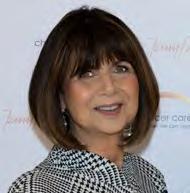
It’s hard to portray just how much Chai’s support and care mean to clients of all ages. Yet, you get an inkling from our heartwarming cover, as you see how the youngest of them can benefit from being immersed in music therapy, which is such a creative outlet for both children and adults affected by a cancer diagnosis. Our deepest appreciation goes to the family of beloved supporters Sir Ralph and Lady Zahava Kohn z’l, who gifted us the magnificent piano you can see. It has, in the words of our music therapist Phil, been ‘transformative’. Discover in our lead story how other clients, too, value their ‘Chai time’.
When Chai began in 1990, our goal was to bring up-to-date information about cancer to the community and remove the taboos surrounding the topic. Back then, we did it through lectures – and it was radical to bring the subject to a lay audience. Now, we live in different times. We’ve seen King Charles and the Princess of Wales share updates and videos about their own cancer diagnoses and, in this issue, we address how to overcome communication blocks that can emerge.
In other features, medical experts explain how treatment decisions are made and who advocates on behalf of the patient. You can read about two new services: one which addresses the physical impact of surgery and another which gives young parents peer support. Holding true to our educational goals, we alert you to the symptoms you shouldn’t ignore, and present healthy eating advice and must-try recipes from a Chai nutritionist.
Our clients are faced with change every day. Now it’s our turn, as our hugely admired CEO, Lisa Steele, steps down. She has been part of the Chai team for more than two decades, and a highly respected and trusted colleague for 12 years in the CEO role. Together we have steered Chai through ground-breaking developments in ways we could not have imagined back in 2012. She has played a significant part in building Chai’s reputation in and beyond the community, as her final report attests. Lisa, you have my heartfelt thanks and gratitude for all your expertise and devotion over the years and we know you’ll always be there for your Chai family.
This has not been an ‘ordinary’ year. We have all shared in the shock and sadness that our extended community in Israel has been experiencing as months of trauma have unfolded. Many of our clients, who are already feeling vulnerable, have expressed this additional layer of worry in their sessions. It reaffirms the imperative for Chai to provide a safe and familiar space where people’s needs are acknowledged, contained and fully supported by our dedicated team.
Every one of our 70 services is made possible thanks to the incredible generosity of the community. Our Campaign pages and 10page round-up of events and activities pays tribute to the treasured commitment of our supporters, both long-standing and new. This wonderful partnership, which is fundamental to Chai, is appreciated every single day, by all of us.

Louise Hager Chairman
Founder Presidents
Susan Shipman-Zuckerbrod
Frances Winegarten z’l
Chairman
Louise Hager
Chief Executive
Lisa Steele
Honorary Patrons
Dame Maureen Lipman DBE
Chief Rabbi Sir Ephraim Mirvis KBE
Trustees
Louise Hager
Philip Hertz
Alexandra Maurice
Rafi Saville
Richard Segal
Leon Shelley
Susan Shipman-Zuckerbrod
Dr Adrian Tookman
Medical Patrons
Prof Michael Baum
Prof Michael Brada
Dr Rachel Craig
Dr Niki Davies
Prof Michael Douek
Prof Andrew Eder
Prof Rosalind Eeles
Dr Ian Ellis
Mr Daren Francis
Miss Joanna Franks
Prof Anthony Goldstone CBE
Prof Daniel Hochhauser
Prof Gordon Jayson
Dr Daniel Krell
Dr Jonathan Krell
Mrs Guida Kurzer
Dr David Landau
Prof Jonathan Ledermann
Dr Gillian Marks
Dr Jane Neerkin
Dr Nicola Rosenfelder
Prof Gordon Rustin
Prof Albert Singer
Dr Jonathan Sive
Dr Adrian Tookman
Dr Laura Tookman
Advisory Board
Brian Brick
Jo Coleman
Alan Fell
Jonathan Freedman
Michael Glass
Diane Kenwood
Alexandra Maurice
Robert Prevezer
Marc Samuels
Dr Adrian Tookman
Forever connected
Preparing to step down as CEO, Lisa Steele looks back over her 23 years in the Chai family
"60 minutes makes all the difference"
What can happen in one transformative hour at Chai

The power in the positive
As NHS England’s Jewish BRCA testing programme continues, we hear from those delivering it to the community
Not all breast cancers are created equal
Just as each diagnosis is different, each treatment is, too. Dr Fharat Raja describes how decisions are made
New service: group support for parents
A forum for those with younger children to ask questions, learn strategies and feel less alone
The Northern focus
How well do you know your body? And would you notice if it was trying to tell you something? Stay alert for these warning signs
Facing melanoma head on
One of the most preventable skin cancers is also increasingly curable, thanks to immunotherapy, says Professor Paul Nathan
You made it happen!
All the 'Chai points' from a phenomenal fundraising weekend last December
Make food your medicine
Chai nutritionist
Susan Fruhman serves up delicious recipes, supercharged with health benefits, in her new cookbook

How to find the words
The impact of a cancer diagnosis can make conversations with loved ones hard. Counsellors offer ideas to get you talking
All together now
All the details, plus a new fee-free fundraising platform 4 6 18 24 34 8 20 12 16 22 40 26 32 33 43 28 14 30
We hear how Chai in the North West and Glasgow meet the individual needs of these communities
We felt the love when more than 100 Chai staff gathered for a day of teambuilding and inspiration

The clinical nurse specialist: a patient’s guide
Guida Kurzer explains this important role which coordinates the medical teams managing a patient’s care
New service: pelvic floor physiotherapy
Surgery and treatment affecting this area can cause distressing symptoms. Help is at hand
Drawing inspiration from Chai
Our Rosh Hashanah cards celebrate the creativity of clients in our art workshops
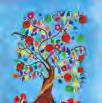
The year at Chai
A round-up of the talks, fundraisers, bake sales, quizzes – and much more – that have filled the calendar
You’re amazing!
The commitment you show to Chai through physical challenges, takes our breath away. Time to say thank you!
Ways to give
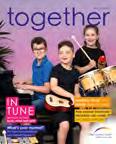
Cover photography: Alexandra Taibel
This edition of together is generously sponsored by The Emmes Foundation
Editor: Deborah Wald
Design: Creative & Commercial
Printing: Kellmatt © Chai Cancer Care 2024
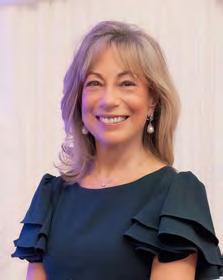
Since 2012, as Chai’s CEO, Lisa Steele has seen the number of clients rise by the thousands and the organisation’s holistic support for those affected by a cancer diagnosis, acknowledged by government and the NHS. Stepping down next January, she highlights the developments that have shaped Chai during those years
Chai never stands still… I can say that with certainty as I look back to 2012, when I became CEO. That year we supported 1,650 clients. The following year the number had jumped by 400. Now it stands at 4,300. It’s a bittersweet ‘success’ story and one I truly wish did not exist. But the reality is that every 90 seconds someone in the UK hears the words, ‘It’s cancer’*, and for as long as that is the case, sadly, we know the demand for our expertise and care will continue.
Always ‘client first’
I started at Chai in 2001 as a volunteer counsellor for just two hours a week, shortly after my father passed away from cancer in 2000. That experience confirmed this was the field I wanted to be in. I understood the sensitivities for patients and loved ones in a cancer scenario, and that everyone has their own specific needs. We see clients aged three to 99. With such a wide demographic, it has been a priority to expand our services and provide increasingly personalised support at each stage of the cancer journey.
Chai has always been 100% client-focused, addressing the emotional impact and physical side-effects of cancer diagnoses and treatment. It’s how we now come to provide 70 specialised services. Quite often, one service has prompted the development of another. For example, in 2008, recognising how cancer impacts younger family members, our Children, Teen and Family service launched. Four years later, Chai in
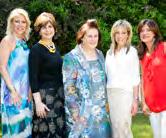
Schools began providing play, art and music therapies during the school day for nursery- and primary-aged children. Chai in Schools now supports pupils, teachers and SENCOs in 29 Jewish and mainstream schools. Figures show since the 1990s, the increase in cancer diganoses is largest in people aged 25-49 where rates have increased by more than a fifth†. Our stats back up this worrying trend: last year 31% of our clients were under 50, this year it’s 37%. Hence, we recently added a specific parents' support group (see p14).
By far the biggest challenge during my time at Chai was Covid, when we had to pivot services online while still maintaining their value for clients.

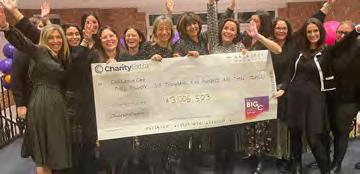
Transferring support online within 24 hours of lockdown was a mammoth task, but we were lucky to have a template as some services were already delivered via phone and Skype. Who knew about Zoom back then?! Chai was at the forefront, picking up where medical support was limited, often as the sole contact for clients in a shut-down world, which only intensified their sense of isolation. Our teams dug deeper than ever before when they, too, were going through their own pandemic experiences. It is a huge tribute to our Client Services Managers (CSMs), counsellors and complementary therapists who adapted with such speed.
Breaking new ground
I am hugely grateful for the input and clarity of our Medical Advisory Panel (MAP), which has been a guiding light for me and each of us involved in clinical services at Chai. With their oversight, every service we develop has been carefully considered and has clearly defined benefits. The knowledge the MAP brings regarding cancer trends and advances in surgery and treatment do so much to inform our strategic plans. This included, in 2011, the opening of the Chai Medical Clinic. It is a national first, designed to support those with the long-term, unmanageable side-effects of cancer surgery and treatment, including pain management, extreme fatigue and severe neuropathy. Macmillan says one in four cancer patients is living with the long-term consequences of the disease. The Clinic is a model for other charities, healthcare professionals, and MPs with a health brief.
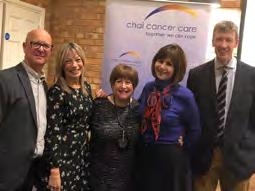
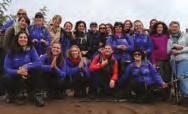
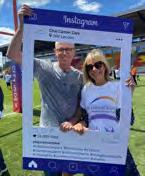
I believe everything that I’ve mentioned highlights the breadth of vision and depth of knowledge that makes Chai unique. The moment you step through the doors of our London flagship centre and regional hubs, the environment is uplifting, calm and healing.
What makes Chai tick?
Each one of us, in every department, up and down the country, is focused and passionate about supporting our clients. Sensitivity and confidentiality run through the whole of the organisation, and to enable this we have built vital infrastructure. Dealing with life and death every day is intense, pressurised, emotional and
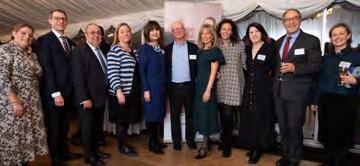
complex work. Staff have regular supervision to ensure they are well supported to do their jobs successfully, while a strong senior management team oversees all clinical aspects of our services.
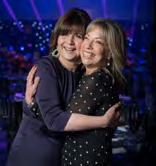
A model for others to follow
I shall forever be inspired by Chai’s co-founders, Frances Winegarten z’l and Susan Shipman-Zuckerbrod, who created this groundbreaking organisation. It is a shining example of innovation and care for the community. Central to my time here has been working closely with Chairman Louise Hager. We have a profound, mutual respect for each other and the expertise we bring to our roles. I am so thankful for her incredible drive, endless creativity and sense of humour at critical times!
Together Louise and I have shared our learnings with national charities such as Maggie’s, Macmillan and Ovarian Cancer Action as well as international cancer support organisations. We welcomed then MPs Craig Tracey and Nicola Richards to the Chai flagship and heard Nicola hail the organisation as a ‘a model of community-based support’ in Parliament.
A drop-in session at Portcullis House in May saw 25 MPs across all parties in attendance, speak with myself and Louise about our work and how to improve cancer support services nationally. An additional endorsement came in 2022 when NHS England selected Chai, alongside Jnetics, to form a unique partnership to lead its awareness campaign for its Jewish BRCA testing programme.
Being Chai’s CEO has been an all-encompassing role and the job description has, in short, got a lot longer! It’s been an honour to have played such an important part in its development and I am confident the organisation is in a strong position going forward. While the time has come for me to spend more time with my family, especially my grandchildren, I know Chai will continue to innovate – and I’m banking on being involved in future plans, so watch this space! It’s been a major part of my life for more than two decades and will always be in my heart.
To the trustees who have provided such wise counsel, I am eternally grateful. It has been the privilege of my working life to be part of an exceptionally dedicated team of staff, counsellors, therapists and volunteers. My heartfelt thanks to you and the whole community who make Chai’s life-enhancing work possible.
‘In the music therapy group, I can sort out the mess in my head, when words alone simply don’t work.’
Beverley
'The art workshop is wonderful – a place where I can release the trauma of my poor diagnosis and express it through art. I eagerly anticipate every class and my spirit lightens knowing everyone there sees me as Susan, not "Susan with cancer".'
Susan
‘I look forward to my weekly session at Chai and gear my schedule around it. Besides hospital visits or illness, my time at Chai is non-negotiable!’
*David
'My fitness suffered greatly after my illness and treatment. The physios worked with me to reverse this, propelling me on a new trajectory I couldn't have imagined. My confidence is restored!'
Sruli
From Hendon to Glasgow, Gibraltar to Hong Kong, in person or on Zoom, one hour at Chai can transform feelings, ease pain and bring joy. But don’t just take our word for it…
'I wanted to believe my husband and I didn't need help. How wrong I was! Chai is everything we need as a family, from therapies to financial and disability advice, to activities that reduce our isolation.'
Julie
‘Chai is the place I go to be truly "held". I don't have to be a mum, or a wife… I can just be taken care of for a change. Thank you!’
*Amanda
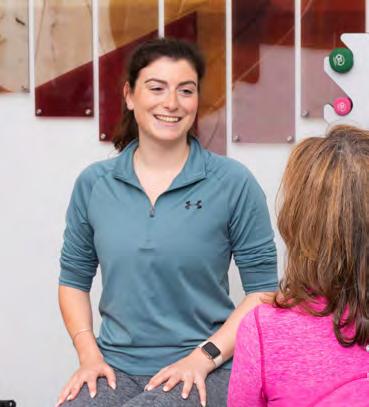
'I love seeing Phil as he gives me time to concentrate on me. I sigh with relief as I express myself by writing songs and the time goes so quickly. This is a song I wrote with Phil.'
Taking me time, sharing stories
Making music, having fun
It’s a blast but it’s gone too fast. Being silly helps me out
Talk or joke or scream and shout
Then you see I can just be me, me, me, me, me
It’s a time to express my feelings
Be creative, write a song.
That’s my jam, that’s my jam, that’s my jam.
Josh, aged 7
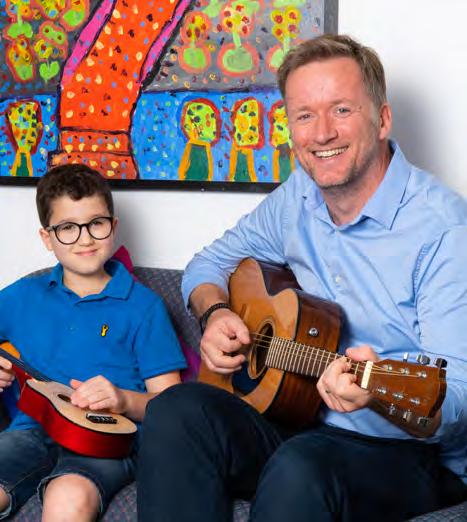
'I cannot begin to tell you what a difference Chai made to Nathalie’s life. She so enjoyed coming to the jewellery and art classes, and her counselling sessions. Just being in the calm, comforting building gave Nathalie normality and social interaction at a time when all the "normal" aspects of her life were slipping from her grasp.’
Steven on behalf of Nathalie z’l
'I'm always excited to see Phil because I might learn something new. I feel happy when we play the musical instruments games – and when I beat the drums! But best of all at Chai are the biscuits!'

Joey, aged 7
‘Every time I step foot into Chai, I feel the tension in my shoulders disappear. Ahead is 60 minutes of relief from the pain, anxiety and stress that cancer brings to daily life. From the client service managers to the counsellors to the MLD [manual lymphatic drainage] practitioners, there is compassion and understanding. I couldn’t wish for a more well-rounded support system!’
Alex
'I arrive in pain at the jewellery group but I soon forget all my aches. Creating something beautiful in such lovely company makes my week so much better.'
Sheila
‘The bereavement group made me realise I could laugh again.’
Joy
'There are six of us strong-minded women in our music workshop, all at different points of our cancer journeys. The music therapist has such empathy and warmth for each of us. Being happy in the moment is transformative and makes us feel very special.'
Francesca







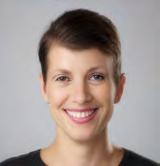


NHS England’s Jewish BRCA testing programme is helping save lives today – and for the future. Chai and Jnetics are spearheading awareness of the initiative in the Jewish community, which is also helping to shape public health policy. As more than 23,000 * men and women sign up, we hear from those involved
Certain things define our health: lifestyle, environment, but above all, our genetic inheritance. We can try to improve on the first two, while the third – responsible for our blue eyes or slender fingers just like grandma – has been largely beyond our control. Now scientists are unlocking genomic secrets including ways to avert future generations inheriting genetic faults that carry the most serious risks.
For people with at least one Jewish grandparent, the occurrence of the BRCA1 and BRCA2 gene mutations is six times higher than in the general population. These mutations give women up to a 72% chance of developing breast cancer and up to a 44% chance of developing ovarian cancer, compared with 11.5% and 1.5% respectively for the general population. In men, the BRCA2 gene fault raises the risk of prostate cancer by up to 27% as opposed to 12.5% in the wider population. A higher risk of pancreatic cancer is also linked to the BRCA gene mutation. The risks apply, to a greater or lesser degree, to Ashkenazi and Sephardi communities. It’s also not generally known that both men and women can carry the gene mutation and there is a 50% chance it will be passed on. The chance to change these statistics could not be more welcome, or more urgent.



Signing up to the programme (currently available in England only) can help a person who has the gene mutation massively reduce their BRCA-related cancer risk. It can be completely eradicated in following generations through a process called preimplantation genetic testing (PGT), which allows selection of embryos free of the gene fault, to be implanted in the womb.
The programme brings together a vast array of stakeholders: NHS England, the Institute of Cancer Research, population geneticist Professor Ranjit Manchanda, and the joint skills of Chai and Jnetics (the Jewish genetics charity), which together have formed Jewish BRCA, to engage people in the campaign and encourage sign up. 'This is a huge opportunity to gain knowledge that will help mitigate against the impact of hereditary cancer, and ultimately save lives,ʼ says Jnetics CEO Nicole Gordon.
It’s not generally known that both men and women can carry the gene mutation and there is a 50% chance it will be passed on’’
Launched in January at the House of Lords (see p37), NHS England’s Jewish BRCA testing programme aims to test 30,000 men and women over three years to identify those with the gene fault. It’s estimated that 89% of Jewish individuals with the mutation have been, until now, unaware of their status.
Chai's CEO Lisa Steele adds, 'We understand the implications of testing positive for the BRCA gene mutations. Population screening allows people to be made aware that they carry the gene. We have developed individual counselling and group support specifically for those receiving a positive result. Chaiʼs counsellors have had enhanced training with psychological, nursing and genetics experts at Northwick Park Genetics Centre and the Royal Marsden and Royal Free Hospitals.’ Lisa stresses that this test identifies solely BRCA1 and 2 mutations and that people should still attend their appointments for other screening programmes.

There is a 50% chance of passing on a BRCA mutation to the next generation. In the Ashkenazi population, approximately 1 in 40 people have a BRCA gene fault. In the Sephardi community, approximately 1 in 140 people have a BRCA gene fault. In the general population, the figure is 1 in 250. 1. 2. 3. 4. 5.
BRCA1 and BRCA2 gene mutations can be carried by, and inherited from either parent.
Professor Ranjit Manchanda,
Gynaecological Oncologist at Barts &
QMUL, has led the research on Jewish population BRCA testing since 2008 and has been developing the Jewish BRCA testing programme since 2020.
Professor Manchandaʼs focus is patient-facing gene testing trials, implementing cancer research and prevention. ‘I am delighted by the response to this programme. Whenever weʼve presented the facts, the message about testing has got through. People see the value in it.
I’m passionate about trying to prevent cancer and save lives’’
‘Everything hinges on it being a well-designed, well-delivered programme. By engaging with the community, we have understood the Jewish community is both broad and close-knit, with different cultural and religious sensitivities. Itʼs very important to be inclusive rather than exclusive.


‘When it comes to measuring success, the fact that 23,000 * people have already come forward to test, shows the programme is working. But it’s no use giving people information about their risk if they cannot then do anything beneficial with it. With monitoring and risk-reducing surgery, they have knowledge and options. It shows we can think in a different way about healthcare. This approach will feed into the health infrastructure – and not just for BRCA. It’s relevant to trials testing populations which have a high prevalence of other cancer-causing genes.
‘We’ll have early data on the outcomes of the programme within three years, and full data over a 10-year period.
ʼThe biggest reward is to see something I started a long time ago come to fruition. I’m passionate about trying to prevent cancer and save lives and it's a privilege to be able to do this work and be part of such a collaborative team.ʼ
Bethany Torr (left), Scientific Programme Manager, Institute of Cancer Research (ICR) and Clare Turnbull, Professor of Transactional Cancer Genetics, ICR
‘Our team sits in the middle of the network of organisations involved in delivering the testing programme. We manage new registrations, send out test packs and ensure completed tests are sent to the NHS laboratories. Once results are back, we send them out to people.
‘We have learned so much working with our community awareness partners, Chai and Jnetics, especially from the counsellors within Chai. Being able to point patients towards community-specific support, that many take up, has allowed for great synergy between them and our genetic counsellors. The ICR’s work encompasses everything from gene discovery through to testing pathways. In fact, the link with BRCA2 and inherited breast cancers was discovered by the ICR and our team has conducted
research around testing methodologies for the last five years for people with breast cancer. The BRCA testing pilot scheme last year helped us understand more about the community, so we come to this project well-equipped to undertake this unique testing project.
We have learned so much, especially from the counsellors within Chai’’
‘There’s been a lot of positive feedback from people pleased to access BRCA gene testing. Our priority has been to get test packs out to women over the age of 40 as their life stage dictates a greater need for early results. Seven hundred packs a week are posted, significantly reducing response times after registration. Results are returned to us within 16 weeks in order for us to notify people. Good communication is essential and has been very effective in allaying people’s concerns about any wait. Chai’s role in supporting people during that period is very much valued.’





Zippora Galpert, Chai counsellor and facilitator for the BRCA-positive support group for clients without cancer. ‘People bring all their BRCArelated concerns to Chai, including whether to test or not. We provide a non-judgmental place to talk things through.
I facilitate the support group for those who have tested positive for BRCA but do not have cancer. Some will have received a positive result having had no family history of BRCA-related cancer. Understandably, they’re overwhelmed and must now get their head around this news.
ʼAt Chai we witness people questioning their mortality. By talking about their feelings, they can gradually move forward, sifting through the emotional impact this has had on them, their loved ones and their future.
The first thing we do is acknowledge the disbelief and anxiety’’
‘We also see those who discover they have the gene mutation, just like the family member they lost. Until recently, they didn’t have the knowledge to do something about it. Now they do. The first thing we do is acknowledge the disbelief and anxiety. People have so many questions: Where do I go with this information? What are my priorities? How do I tell family members? There are numerous scenarios: a young woman or man without a partner who wants kids, finds they are a carrier. Now what? A man in his 50s must tell his son or daughter that they may have an increased risk of cancer.
Marissa*, 69, and husband Harold*, 71, both took the BRCA gene test. Harold was negative but Marissa discovered she is BRCA-positive. Marissa says: ‘Someone in our family WhatsApp group mentioned the NHS BRCA screening programme and said, “I’m getting tested, are you?” There was no cancer history in the family, so my husband and I thought, “Why not?”. We feel it’s important to get tested for things once you’re a certain age.
‘I sent off for the test kit and didn’t over-think doing it. It was a bit like reading about the contraindications when you take medication. A couple of months later, I received a letter from the NHS telling me I had the mutation. I was reeling; now there was so much to think about. Within the week, I received a call from an NHS genetics counsellor





ʼDifficult feelings may emerge within a family over big decisions: whether to opt for surgery or surveillance; a father anguished at passing on the BRCA fault to his daughter; guilt at not having the faulty gene when a sibling does. Isolation comes up a lot. One client articulated, “I have the mutation, but I don’t have cancer. It looks as though I’m ‘lucky’. Yet I am facing having drastic surgery and that’s harder for me and those around me to comprehend.”
ʼWe create a safe environment in our groups. They are small and intimate with a broad mix of people who find they share many common experiences. As they do, their isolation lessens.
ʼWhat’s unique about Chai is the extended support. A woman in her late 20s gets a BRCA-positive result and we can be there for her, her boyfriend and her parents if they wish. We are here to help support each one of them.’
who explained how things would move forward. In the letter I received, I saw that I could speak to Chai. I wanted to talk about my dilemma and how to tell my sister and my sons. I chose to speak one-to-one to a counsellor. She understood me perfectly: I felt so nurtured and held as I digested this news.
ʼChai was like an oasis of peace, and with the counsellorʼs support and guidance, I prepared myself to tell my family. It’s a bombshell to present and it was a relief when it was finally out in the open. It freed me to think about myself and the implication of my own choices. I’m now being monitored for breast cancer and waiting to have my ovaries removed because the risk of cancer is higher between the ages of 70 and 80. It’s not ideal but doing this will give me peace of mind. My counsellor has helped me turn a very pessimistic outlook into a more optimistic one.
My counsellor helped me turn a very pessimistic outlook into a more optimistic one’’

‘To someone who has tested positive, I would say you don’t have to worry on your own. We all have a genetic inheritance and it’s nobody’s fault. Moving forward emotionally has let me move forward medically. Chai has been so important in getting me to that point.ʼ

Prof. Peter Johnson, National Clinical Director for Cancer at NHS England ‘BRCA testing for the people most at risk has the potential to save lives by allowing them to take steps to reduce the chance of cancers developing or making sure that it can be detected as early as possible. Those at increased risk can take advantage of surveillance and prevention programmes with their health teams.
Finding out early means people can get the support they need from the NHS’’
'We know it can be daunting finding out whether you have an altered BRCA gene, and some people may feel they’d rather not know, but finding out early means people can get the support they need from the NHS.
'We have seen a great response since the launch of the NHS BRCA Testing Programme in January, and we continue to encourage as many people as possible to take advantage of this. So please do come forward for a simple saliva test, if you are eligible – most won’t have an altered gene, but if you do, the NHS can provide you with further testing, surveillance or treatment.’
I want to register,
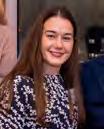
Susana Lukic, Programme Manager, Early Diagnosis Programmes, NHS England Cancer Programme. ‘The response from the Jewish population in England is exactly what we hoped for. The NHS did a lot of work with the Jewish community to encourage uptake of COVID vaccines and we used learnings from these teams to shape our approach. The awareness campaign via traditional and social media has helped us reach different age groups across England.
This is a novel way of delivering genetic testing: via a saliva test kit people use at home’’
‘Previously, the standard route of genetic testing would be referral to a local clinical genetic service for a face-to-face appointment and blood test, which could take six months. This saliva test kit people can complete at home alongside information given online, is a truly novel way of delivering genetic testing. Dedicated laboratories are analysing the saliva samples and genetic counselling is at the end of the phone. In the years ahead, we’ll be able to look at the data and see exactly how many women accessed risk-reducing, lifesaving treatments and screening services.’
1
You must be 18 or over with at least one Jewish grandparent
2
Register at jewishbrca.org or call via the helpline 020 3437 6001 for further information and to speak to a genetic counsellor.
3
The saliva test kit is sent to you with an information booklet about BRCA genes and step-by-step guidance for completing the test.
4
Having considered the implications and made your informed choice, do the test, sign the consent form and return both in the pre-paid envelope, at a Post Office.
5
If you have highlighted a BRCA gene fault in the family, an NHS genetic counsellor will be in contact to discuss the implications.
6
The test goes to the lab and results are mailed out within 16 weeks.
7
Men and women receiving BRCA-positive results are called within a week and are referred into the NHS system for genetic counselling, enhanced scans, medical consultations and management through their regional genetic centre.
8
Chai’s BRCA-related services include group support for BRCA-positive clients with and without cancer, and individual counselling.
For further details, email (London) charlotteh@chaicancercare.org or call 020 8457 3238 and (North West) amanda.newdall@chaicancercare.org or call 0161 772 4064.


Approximately 55,000 women and 370 men are diagnosed with breast cancer in the UK every year. With hundreds of different types of cancer, it makes treatment a complex challenge. Dr Fharat Raja explains how those choices are made
The causes of breast cancer are so varied, and we can’t always know why a person develops it. While it’s more common in older and post-menopausal women, gender and ethnicity also play a part. Early detection, screening and awareness are cornerstones for defeating the disease, alongside continued research. Yet, despite publicity campaigns to raise awareness of the signs and symptoms of breast cancer and a breast screening programme for women between the ages of 50 and 70, a third of women do not turn up for their mammogram. That’s a huge number of women missing out on early diagnosis and treatment.
Which factors matter?
1. Genes. Some inherited gene mutations increase the risk of breast cancer such as the BRCA1, BRCA2 and PALB2. The Jewish community is now the focus of a huge NHS England programme (seejewishbrca.org) to seek out those with BRCA1 and 2 genes who are at risk of developing the disease (see page 8 for our BRCA update). It gives those carrying
a faulty gene, proactive options through screening and/or surgery, to prevent cancer from developing.
In some families, there may be a strong history of breast cancer, yet no faulty gene is found. These high-risk families need close monitoring and similarly, preventative steps may involve riskreducing breast surgery, screening, or hormone treatments.
“
2. Hormones.
Women who start their periods early and/or have a late menopause carry a slightly raised risk of breast cancer though that reduces for women who have given birth and breast fed. Oral contraceptives can raise the risk of breast cancer and HRT is not recommended for those who have had hormone-positive breast cancer.
contributors to higher rates of breast (and other) cancers. Regular exercise, good diet, reduced or no alcohol, increased consumption of vegetables, fruits and probiotics for optimal gut microbiome are all recommended to reduce one’s risk.
4. Other external factors. Air pollution, parabens, pesticides and herbicides, etc. are being studied for their impact on breast cancer.
Despite campaigns to raise awareness of the symptoms of breast cancer for women between the ages of 50 and 70, a third do not turn up for their mammogram"
3. Lifestyle. Obesity, alcohol consumption and a sedentary lifestyle are known
If your GP refers you to a breast clinic for further investigation, this will likely include a mammogram, ultrasound scan and a biopsy, if the scans are suspicious. Should breast cancer be present, a breast MRI and total body CT or PET scan may be carried out. These are reviewed by a specialist team of surgeons, oncologists, radiologists, pathologists and breast care nurses, and in discussion with the patient, a treatment plan is formulated.
While the physical signs of possible breast cancer are the same [see box, right, for how to self-check], the many causes of breast cancer mean the condition has several sub-types. It’s the architecture and origins of a tumour (ductal or lobular), the receptors/proteins on cancer cells (triple negative, HER 2 positives, ER positive) or stage of the cancer (0 to 4), that determine treatment.
‘Hormone positive’ tumours affect twothirds of all women and are distinguished by high levels of ER (oestrogen receptor positive), PR (progesterone receptor positive or negative) and HER2 negative hormones. Treatment depends on the size and grade of the tumour, but all women will be recommended surgery and hormone treatment. In addition, new genomic tests show whether chemotherapy will benefit a patient (meaning more women are spared the intensive treatments and side effects).
tissue) or mastectomy (removal of the entire breast) and lymph nodes, if dictated by the stage and invasiveness of cancer. Techniques to minimise surgery in the armpit, and reconstructive surgery, are offered to women having mastectomies.
Radiotherapy: High-energy beams target and kill cancer cells and can also be given for secondary breast cancer to stabilise the area.
Chemotherapy: Powerful drugs that destroy cancer cells throughout the body, either before or after surgery and remain an essential part of breast cancer treatment for many women.
While the physical signs of possible breast cancer are the same, it’s the architecture and the stage that determine treatment" “
Endocrine Therapy: For hormone receptorpositive cancers, medications like tamoxifen or aromatase inhibitors block hormone receptors to slow or stop cancer growth. They are a long-term treatment, lasting between 5-10 years. Endocrine Therapy is also used in secondary breast cancer and often combined with targeted treatments (see below).
Self-examination should be done once a month. See your GP if any of these are evident:
1. LUMP IN THE BREAST: Often the first noticeable symptom (though breast lumps can also be benign).
2. CHANGES IN BREAST SIZE OR SHAPE or change in the skin texture with dimpling, puckering, or bulging.
3. NIPPLE CHANGES: Nipple retraction, discharge, or scaling can indicate underlying issues.
4.
With triple-negative breast cancers (TNBC), the cancer lacks oestrogen, progesterone, and HER2 receptors, which makes treatment more challenging. However, immunotherapy has improved outcomes and significantly reduces the risk of recurrence. This has been a big leap for women going through this more aggressive breast cancer.
HER2-positive breast cancer is characterised by high levels of the HER2 protein – a growth factor for cancer cells. More than 25 years after the landmark discovery of Herceptin, multiple drugs have been developed and millions of lives of women with this type of breast cancer have been saved.
Medical science has seen the development of tailored treatment prescriptions based on these cancer types, stages, and individual patient factors, and may include:
Surgery: These encompass lumpectomy (removal of the tumour and surrounding
Targeted Therapy: Increasingly used in breast cancer to target cancer cells with certain genetic mutations. A class of drugs called CDK4/6 inhibitors has revolutionised the treatment for metastatic hormone positive breast cancer and one of these, abemaciclib, is approved for early breast cancer for higher-risk women.
Immunotherapy: Boosting the body's immune response to fight cancer cells is a promising approach for certain types of breast cancer.
Despite the rise in numbers diagnosed and the challenges posed, advances in early detection and treatment of breast cancer have significantly improved survival rates and quality of life for patients, even those with incurable cancer. Timely diagnosis, personalised treatment plans, and ongoing support, including services that add holistically to a woman’s wellbeing such as those at Chai, mean many women go on to lead fulfilling lives post-treatment. We have come a long way.
5.
BREAST PAIN: Most breast pain is not cancer-related, but persistent discomfort in one area should be evaluated.
SWELLING OF LYMPH NODES: Enlarged lymph nodes under the arm or around the collarbone may signal breast cancer.
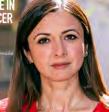
Dr Fharat Raja qualified at Oxford and took her postgraduate training in medical oncology at University College London Hospital and Mount Vernon Cancer Centre. She is a consultant at UCLH and North Middlesex University Hospital, specialising in breast cancer and acute oncology. She is active in clinical trials and education for breast cancer. Her studies have been published in the Lancet and the British Journal of Cancer among others.
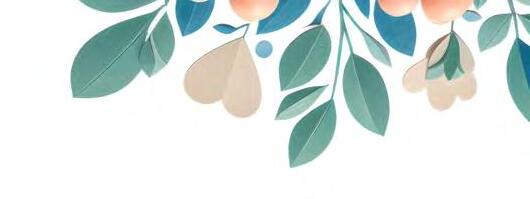
Peer support conversations include whether to use the word ‘cancer’ around children" "

Cancer diagnoses among those aged 25-49 * are up by over a fifth, affecting many parents of teens and younger children. Chai is helping them and their partners look after the family’s wellbeing
It was while she was working with families in hospitals where children were treated for cancer that Sara Rey, a child and adolescent psychotherapist, saw how parents supported and empathised with each other as they chatted on the wards. The experience has significantly informed her role as facilitator of Chai’s parent support group.
Since last September, Sara's weekly Zoom meeting for a small group of parents has been providing a reassuring space for patients and their partners to voice their feelings and concerns about the impact of cancer on their family unit.
‘The biggest fear parents express is of dying and their children growing up not knowing them,’ says Sara. Other frequently-heard issues are breaking the news; the need to still parent; setting boundaries; changes in sibling dynamics; anxiety around telling children when treatment doesn't go as hoped; feelings of isolation within the family. How do you tell


whether a child is acting out (ignoring requests) as part of their normal development or whether it's connected to the illness?

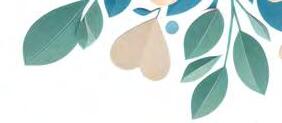
"
Sara raises these themes, enabling parents to engage, talk and hear different perspectives on managing family life under the pressure of cancer. Practical examples of peer support have included conversations about whether to use the word ‘cancer’ around children. One parent revealed how a child became less frightened once they understood what was going on. Another, noticing changes in their child’s behaviour, heard how weekly play therapy at Chai helped someone else's child. The parent of a teen was able to shed light on what younger children may be experiencing, having already gone through that stage. ‘Everyone can have their own viewpoint, there’s no right or wrong, no judgement, no taboos and no competition,’ says Sara. ‘What I see is immense respect and compassion for each person’s situation.’
What I see is immense respect and compassion for each person’s situation"
The advantage of a virtual approach is that someone quite ill can tune in, as well as their partner who is doing school runs, shopping, cleaning, working. The only wariness Sara has encountered is when a group member expresses fear of listening to someone else's pain while having to manage their own. She says it gives parents space to feel their fears because they know they are not alone with them. When a cancer diagnosis makes you feel separated from the world, the group is where those fears can be safely voiced. There are tears but there’s a lot of laughter, too. 'Plus, the beauty of Chai,’ Sara concludes, ‘is that if issues come up which are not connected to parenting, I can highlight all the additional services that are there to help. Chai holds the whole family; it’s a special organisation.’
My husband was diagnosed with terminal cancer at the age of 58 and we have a 6-year-old child. I did not realise how valuable the support group would be to me and early on, didn’t always feel like joining. However, I soon realised how good it was to have my own space (my husband did not attend) and to touch base with other parents. Though we may have different circumstances, we are all dealing with cancer as well as having to parent. What started as a bi-monthly support group soon became weekly, such was our need and its importance.’
I joined the support group when it began last year and, as a parent with cancer, I have found it so helpful. Sara makes it easy for us to talk and steps in occasionally with advice and resources. The warmth of everyone is evident and I genuinely feel listened to. The group makes you realise you are not alone with what's happening around your children. Any parent would benefit from joining.’
By using art to articulate, communicate and release thoughts and emotions, children can develop confidence and self-acceptance. With the guidance of the art therapist, behavioural patterns and emotions are worked through in a non-threatening setting, using creative expression.
Where words fail, music can be a valuable channel for airing feelings. Children and teens may find it difficult to make sense of the huge and confusing range of emotions
they are feeling. Chai’s registered music therapists provide individual and group sessions, allowing them to find meaning and creativity in the sounds they create. No musical skill required!
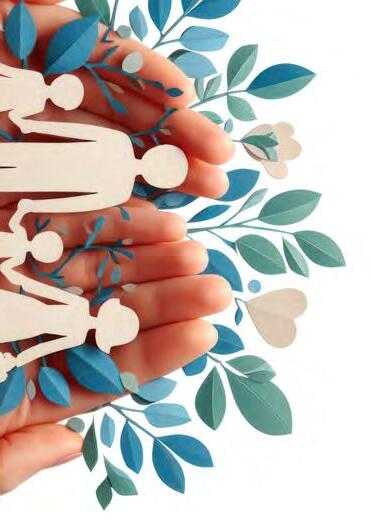
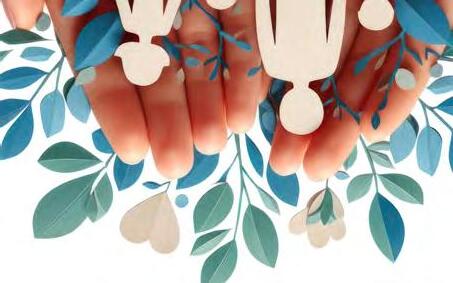
Children often communicate their feelings most naturally through toys and play. With the support of a trained therapist, ageappropriate props such as puppets and art and craft materials, help a child reflect their feelings, and better understand and cope with their emotions in response to the changes going on in their lives.
Each of the above services can be delivered at a Chai centre or in school, under our Chai in Schools programme, so there is minimal disruption to a child’s day. Maintaining routine is an essential way to keep a child feeling safe when cancer makes life so unpredictable. Chai in Schools slots into their day, within the safe and familiar setting of school, easing the burden of demands on a family already stretched. Support is available for children at any point in the family’s cancer experience and for continuity can be accessed during school holidays at a Chai centre.
Chai’s North West hub supports clients across the largest geographic area in the UK and the Glasgow satellite covers one of the smallest. While every community has its nuances, our ethos of professionalism and care from the heart remains universal, as we find out

Gerry Singer Head of Operations North West

Mandy Strang Client Services Manager Glasgow
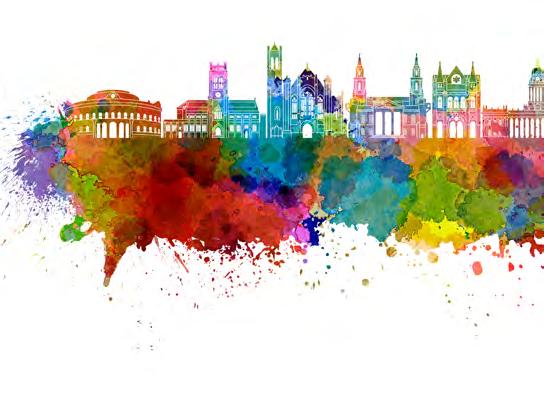

Amanda Newdall Head of Clinical Services North West

Hazel Tenby Client Services Manager Glasgow
North West: 0161 772 4064
0141 638 2483
When Chai teams from around the country gathered in June at the flagship centre for an Away Day (see p28), it was an important opportunity for all to share experiences of how they deliver support to their respective communities. Amanda Newdall, Head of Clinical Services in the North West explains the perspective in her region: ‘The Leeds, North and South Manchester, Liverpool and Gateshead communities all have distinct characteristics. How we reach out to those who can benefit from Chai’s services, adapts accordingly.’ She suggests that London, having the biggest Jewish community in the UK, offers a larger degree of anonymity. ‘Outside the capital, you’re more likely to meet people you know,’ says Amanda. ‘Offering reassurance about confidentiality is paramount.’
Seeing is believing
A ‘show and tell’ strategy goes a long way to achieving this aim. Head of Operations in the North West, Gerry Singer spends time connecting to as wide a group of people as possible to educate about Chai’s services. She also covers the promotion of the NHS Jewish BRCA testing programme in the North West. ‘I’m raising awareness of Chai, not only to the Jewish community, but also to the medical profession (hospitals, nurses and consultants, hospices, health visitors), and anyone else who may encounter cancer patients who are Jewish.’
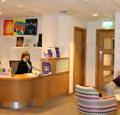
Visits from national cancer charities including Macmillan and Maggie’s to the North West hub based at Healthlands Village, are another valuable opportunity to exchange knowledge and highlight specialisms. ‘Without fail, these organisations are impressed, especially that our services extend to family members, and they begin signposting Chai to their clients,’ says Gerry. Chai is
They can speak to congregants about Chai with conviction – that makes a huge difference to trust levels”

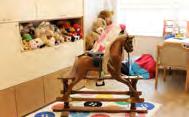
able to complement other agencies providing support.
‘For example, we work cooperatively with hospitals, when a Jewish patient may request counselling or other services from us,’ adds Amanda.
Inviting Rabbanim and lay leaders to visit Chai is a gamechanger. Gerry states, ‘Many have heard of Chai, but seeing its setting is key. They can then speak to their congregants with conviction about the gym and physiotherapy, the fantastic play therapy room, the beautiful art studio, about support for children through Chai in Schools, and our other services. That makes a huge difference to trust levels in the community.’ Visitors learn that Chai does not charge for any services, that people can self-refer and that transport is available to bring clients to their local centres.
Amanda concludes: ‘The overriding message is that Chai is totally professional, with a dedicated team of experts who deliver services to the highest level. Our counsellors and therapists reflect the spectrum of the community, including support for clients’ non-Jewish partners and family. Clients can also request support from outside their area, so a counsellor in Manchester may see a client in Liverpool.’
The Chai wing in Healthlands recently expanded with a new creative arts room and more office space. South Manchester Chai has rooms at Belong Morris Feinmann in Didsbury. Chai in Leeds has doubled its capacity with two bespoke rooms within a holistic centre, allowing for more face-to-face support. A new women’s committee is raising awareness of the additional resource and services now available locally. In Liverpool, most support is delivered via Chai’s Home Support Service, online and by phone. And in Gateshead, services are by Zoom and phone (Covid showed how successful that can be).
In Scotland, Client Services Managers Mandy Strang and Hazel Tenby run Chai’s new hub at the Walton Jewish Community Centre in Giffnock where the team now numbers six counsellors and therapists. ‘The space is welcoming and comfortable, in a professional setting that’s familiar to many,’ says Mandy. ‘It’s a calming environment that can provide a much-needed change of scene for clients who may be spending a lot of time in hospital or at home. During challenging times, it’s an all-embracing place to go.’
In this much smaller catchment area, where pretty much everyone knows each other in the community, assurance of privacy is given in several ways. Chai is situated away from the central hub of the Centre to minimise visibility of clients. Counsellors outside the community are available for face-to-face, home visits, or phone/ Zoom support. ‘We do our utmost to reassure clients, and we don’t want their reticence about confidentiality to be a reason to hold off coming to us,' says Hazel.
At the same time, more prominent signage at the centre is prompting enquiries from visitors about what Chai does and both Mandy and Hazel give talks to community and synagogue groups. The two rooms in the Walton Centre are used for counselling and therapeutic treatments, such as acupuncture, aromatherapy, reiki and massage. Art therapy is also available for children and adults, on site or at home, and an in-person mindfulness group recently started. ‘As well as the benefits of this therapy, the interaction clients get has a hugely positive effect,’ says Mandy. Clients can tune in from home to many more services online such as group support and one-to-one advisory expertise (to assist with blue badge and benefits applications) by phone or Zoom. ‘Word of mouth is our biggest lever for encouraging potential clients to come forward,’ says Hazel. ‘Once a person has had Chai’s support, they become our biggest advocates!’
Once a person has had our support, they become our biggest advocates!”
There are over 200 different types of cancer, with symptoms that can range from vague to more specific. But recognising when your body isn’t its usual self, is a baseline for when to get checked out


Identifying the signs of cancer is not always easy. Symptoms like extreme fatigue, unexpected weight changes or a persistent cough may have a multitude of causes unrelated to cancer (but should be examined by your GP anyway). There are, however, other more specific signs that shout louder for attention: constant mouth ulcers, jaundice, changes to your moles. Our bodies have unique physiological responses and patterns. We’re so used to them that we barely take notice of these physical traits. But stopping to observe those ‘normal for me’ characteristics helps us become more body aware, making it easier to spot when something has changed. Many women selfexamine their breasts monthly and men are encouraged to do the same for their testicles to aid familiarity with the body.
Dame Cally Palmer, Chief Executive of The Royal Marsden says, ‘While signs and symptoms vary for different cancers, there are common symptoms such as unexplained pain or discomfort for three weeks or more, an unexplained lump
Giving the receptionist some details about your concern can help push you up the list for an early appointment.
Don’t be coy: Tell your doctor what’s happening, even if it seems irrelevant or embarrassing. Your doctor needs a full picture.
Descriptions help: Explain the body changes that are worrying you; how long you have had them; what makes them better or worse; tell them what medication you are on already.
Take pen and paper: Information can be hard to retain when you’re anxious (for example, any tests that may be required) so make notes or take a friend along to be your second pair of ears.
anywhere on the body, or unexpected bleeding. Anyone experiencing any of these should not put off seeing their GP.’
Being more in sync with what your body is telling you doesn’t always translate into taking action. Understandably so, when we fear it might be something serious. An NHS survey last year showed that 44% of people would avoid seeing their GP if they noticed a change in their body that they thought could be cancer. Further NHS research revealed that 46% of men did not think blood in the urine was a symptom of cancer. And 39% would wait multiple times before seeing a GP. ‘Having blood in your pee – even just once – shouldn’t be ignored because it can be a sign of cancer,’ says Professor Peter Johnson, National Clinical Director for Cancer at NHS England. Different cancers can affect genders differently, too, with men more susceptible to melanoma than women, for example. There may be physical reasons (a man’s skin has
less fat beneath it), but quite often it comes down to awareness. A study by the Men’s Health Forum found that men were twice as likely to have inadequate ‘health literacy’ than women.
There are lifestyle adaptations that can minimise our cancer risk: being a nonsmoker and limiting alcohol, maintaining a healthy weight and eating a nutritious diet, taking regular exercise and attending health screenings as they become available.
empowering people with knowledge to help reduce their cancer risk.
Chai raises awareness about cancer signs, symptoms and how best to protect yourself, on Instagram, Facebook and X. Search @chaicancercare
Dr Ellie Cannon (who spoke at the Chai Away Day, see p28) reports: ‘GPs see too many women miss their cervical screening when called, which means they are in danger of being diagnosed late. This needs to change.’
The NHS England Jewish BRCA Testing programme is an allied example where screening is
All the evidence shows that early diagnosis of cancer is the clearest predictor of a successful outcome. Cancer Research UK says around nine in 10 bowel cancer patients survive beyond five years if caught at stage one, compared to one in 10 when diagnosed at stage four. Almost all breast cancer patients survive beyond five years if diagnosed at stage one compared to only three in 10 if diagnosed at stage four. Early diagnosis also means treatment generally is safer, less aggressive and better tolerated. With short- and longterm side-effects from the cancer and its treatment minimised, there’s every reason to get wise to the ways your body behaves.
If these persist for more than three weeks of being noticed, it’s time to visit your GP.
Extreme fatigue
Lump or area of thickening that can be felt under the skin
Weight changes, including unintended loss or gain
Skin changes, such as yellowing, darkening or redness of the skin, sores that won't heal, or changes to existing moles
Changes in bowel or bladder habits
Persistent cough or trouble breathing
Difficulty swallowing
Hoarseness
Persistent indigestion or discomfort after eating
Persistent, unexplained muscle or joint pain
Persistent, unexplained fevers or night sweats
Unexplained bleeding or bruising
Know your signs and symptoms Visit nhs.uk/cancersymptoms or scan here
The NHS currently runs three screening schemes: for breast, cervical and bowel cancer, which can help pick up symptoms before they impact the body more obviously. There is no screening programme for prostate cancer at present, but you can request a PSA test (which checks your levels of prostate-specific antigen) from your doctor. This is especially important if there is a history of prostate cancer in your family. The good news: NHS research shows 3 in 4 men with a raised PSA level will not have cancer*.
Bowel screening (done with a home test kit) every two years
England: ages 54-74
Scotland: ages 50-74
Wales: ages 51-74
Breast screening (mammogram):
Across the UK: every three years, ages 50-70
Cervical screening (smear test):
England: every three years, ages 25-49; every five years, ages 50-64
Scotland and Wales: every three years, ages 25-64.
A recent Cancer Research UK report is predicting an alarming rise in this type of skin cancer. Professor Paul Nathan explains how immunotherapy works and its role in the frontline of melanoma treatment
News channels often feature headline-grabbing stories about advances in cancer treatment. And with good reason – approximately half of us will develop a cancer and, sadly, a third of us will die from the disease. Sometimes the publicity proves to be premature and the lay person can’t always distinguish between major progress and a short-lived story about for something that will never deliver improved outcomes. Immunotherapy treatment is one where the promise has truly been transformative, and where melanoma is concerned, it has radically shifted the dial.
Melanoma is the most lethal form of skin cancer and cases have risen by almost a third between 2009 and 2019, a greater increase than any other cancer in the UK over the last few decades. Those of us with fair skin that burns easily in the sun, blue eyes, red or blonde hair, or with lots of moles, are at increased risk of developing melanoma. We can’t do anything about the type of skin or eye colour we inherit. We can, however, protect ourselves and avoid skin burn or excessive long-term sun exposure. Approximately 85% of melanomas are thought to be triggered by UV exposure. The Cancer Research UK report, too, states that 17,000 melanoma cases every year are preventable with almost nine in 10 caused by too much ultraviolet (UV) radiation. It is, of course, always better to avoid cancer developing rather than attempting to treat it once it has, however good the treatment prospects.
Like most cancers, early detection and treatment of a primary melanoma reduces the chance that the cancer cells can escape from their start point and spread in the blood stream and lymph system to other parts of the body. The warning signs of a primary melanoma include a mole or mark on the skin that
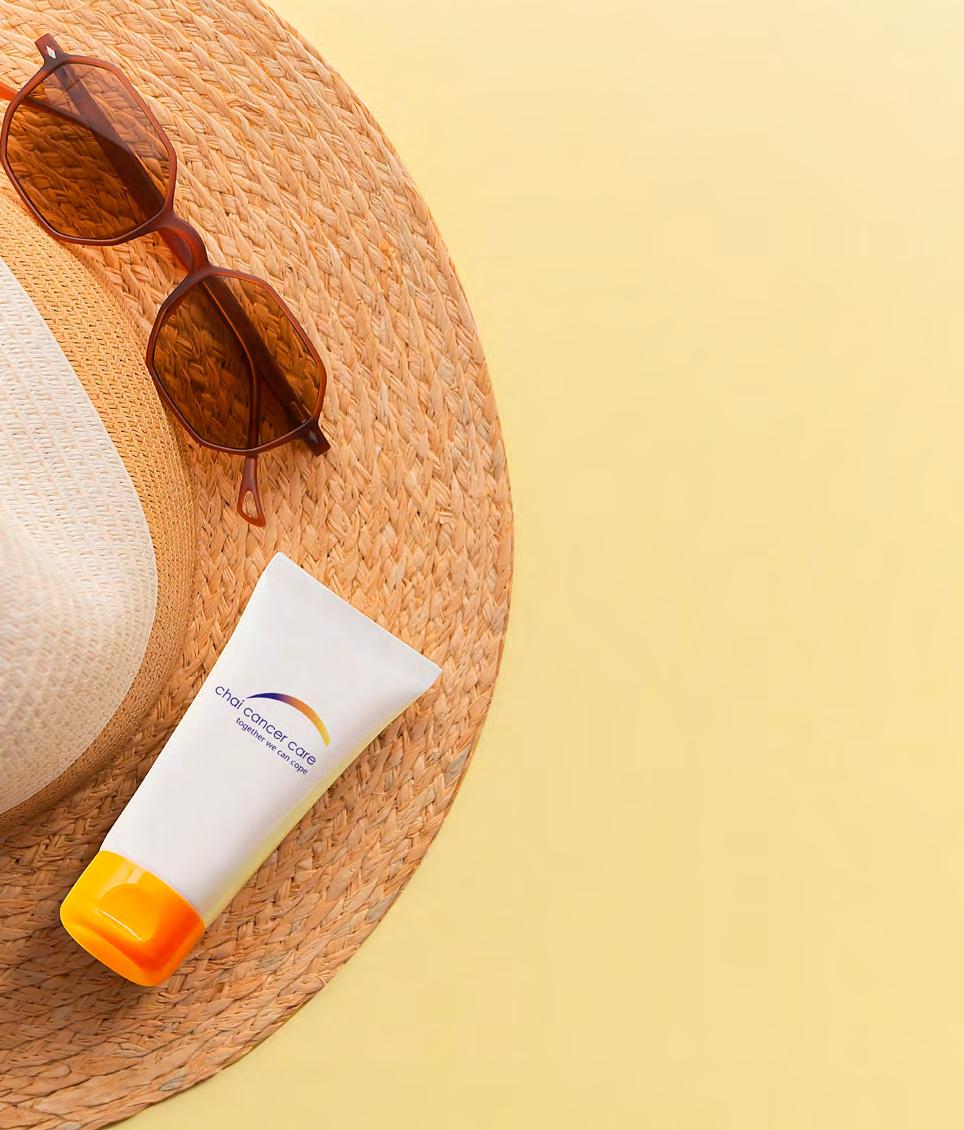

changes in size, shape or colour. You can find excellent information on Melanoma Focus, the leading national melanoma charity website (melanomafocus.org ) and GPs should be informed of any skin lesions that are concerning. It bears repeating: the earlier a melanoma is found, the greater the likelihood that the patient will be cured by simple removal.
Immunotherapy steps in
Should the melanoma grow to the point where there is a significant risk of it escaping and spreading, or indeed, when it has already spread to other parts of the body, patients are referred by their dermatologist or surgeon to specialist melanoma oncologists. We use drugs to either reduce the chance of a future problem or to try and control the melanoma wherever it has spread to in the body. It is at this point that immunotherapy plays an important role for many patients.
The immune system evolved to protect us from invasive infections. To do this, it needs to be able to distinguish between ‘self’ and ‘foreign’, attacking the invader whilst sparing normal tissues. There are important control pathways that turn the immune system on and off. Sometimes, the immune system gets it wrong, leading to autoimmune diseases such as rheumatoid arthritis, thyroid disease and others.
It transpires that cancers can sometimes override these immune system control pathways, turning the immune system off so that the cancer itself is not attacked. Approximately 15 years ago, immune checkpoint inhibitor drugs entered the clinic in early trials. They work by turning on the immune system to fight cancer, blocking the immune ‘off-switches’ that have been hijacked by the cancer, and allowing the immune cells to wake up and attack the cancer. This step change transformed outcomes and the scientists who made the crucial laboratory discoveries that led to these treatments, James Allison and Tasuku Honjo, were rightly awarded the Nobel Prize in 2018.
Immunotherapy treatments require specialist medical oncology management. Interfering with control mechanisms of the immune system can often result in a range of side effects, some of which can be highly threatening, caused by the immune system attacking normal ‘self’ tissues. It has been a steep learning curve to ensure we maximise the benefit and, as far as possible, limit the harm from these treatments.

The earlier a melanoma is found, the greater the likelihood that the patient will be cured by simple removal" “
chance of being cured because of immunotherapy treatment. It is remarkable to see how melanoma can be stopped in its tracks, unable to evolve and escape recognition by the immune system.
Once they have escaped to distant sites in the body, many common cancers cannot be cured. Treatments are increasingly impactful, however, and often patients can stay well for many years. Ultimately, however, the cancer can evolve to become resistant to chemotherapy. This used to happen to almost all melanoma patients with advanced disease. Outcomes were poor, with many patients surviving less than a year. Now, nearly 15 years on, a significant proportion of our patients with advanced melanoma have a
Major advances such as these do still need to be kept in perspective. While a sizeable minority of our patients experience profound benefit, many patients do not have such good longterm outcomes and a minority will have life-changing side effects from the immunotherapy drugs themselves. We are working to identify treatment improvements and major melanoma centres run extensive clinical trials to bring forward the most exciting potential advances to patients. For anyone finding themselves in the position of needing to see an oncologist, I would encourage them to ask whether there are any relevant trials at their own or other institutions.
Immunotherapy has proved that some patients with previously incurable cancers can be cured. Our challenge now is to build upon these advances as rapidly as we can so that eventually all our patients can be optimistic about their outcomes.
1.
How to protect yourself against developing melanoma Skin-deep know-how Treatments are increasingly impactful, and often patients can stay well for many years" “
Shade and clothing are better than sunscreen at protecting your skin. You shouldn’t use sunscreen to spend longer in the sun. But it can be useful for protecting the parts of skin not covered by clothing or shade. Use factor 50.
2.
Be aware of any skin lesions that change in size, shape or colour and report them to your GP immediately. Photographs over time can be helpful.
3.
It is easy to underestimate the threat from a primary melanoma – don't delay reporting any change.

Professor Paul Nathan is an internationally renowned consultant medical oncologist and has led many clinical trials in the field of immunotherapy and targeted therapies. Most recently he led the development of tebentafusp, the first drug proven to improve survival in advanced uveal melanoma. He practices at Mount Vernon Cancer Centre and UCLH. Professor Nathan's clinical interests include melanoma of the skin, eye, and internal organs; kidney cancer and rare skin cancers.
Over a jam-packed weekend in December, awareness events and astonishing fundraising drew the community together in moving, magnificent and mad ways.
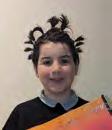
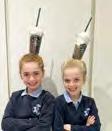
All the fun of the hair when 17 Jewish primary schools and nurseries took part in Mad Hair Day.

Chai’s HQ in Hendon hosted more than 100 children at the Chai Kids Family Fun Day. All have family members being supported by Chai. Happy memories were made with a dress up photo booth, face painting, jewellery making, cookie decorating, hair braiding and more. Guest appearances by Dudley and Toby, two of Chai’s pet therapy dogs were a hit, with the kids declaring them ‘pawsome!’

In the North West the Forever Chai committee’s annual quiz had a 90s theme. Table props of cassette tapes, Motorola mobiles and Gameboys captured the era, and rounds included 'Guess the 90s advert'. The winning team was the brilliantly named Quizteam Aguilera. In London, Young Chai’s ‘Spin4Chai’ saw 16 exercise fiends raise heartrates and funds. Louise Harris got stuck in with a 24-hour bake-a-thon, livestreaming to her Instagram followers, while Lynne Silver and Andee Roback reprised their touching hit show Dear Phylis inspired by a young woman’s wartime diary and letters.


Head of Community Engagement, Caroline Tunkel, takes Chai into Jewish primary schools with the annual Mad Hair Day event, when children don crazy hairdos for the day. Ahead of this, she visits assemblies to open the conversation about what cancer is. ‘We want young children to be able to hear the word without feeling scared, and to know what Chai does.’
Making big topics relatable is a balancing act – hence the fun aspect of children dressing up their tresses. Caroline draws on experiences children may have had to inform them further. ‘For example, I talk about how lucky we are to have lovely hair that we can do crazy things with, but that sometimes they may see people who don’t have hair [during chemo]. That leads to the conversation about “yukky medicine” that we sometimes take to help us get better when we’re ill.’
She invites the children to tap out happy and sad rhythms on the floor or describe a happy or sad painting. ‘It illustrates how music, play, and art therapies can support their mental wellbeing when it’s hard to put feelings into words. Assembly is also the time to mention Chai in Schools, when we support children during the school day. We also discuss ideas about tzedakah. I explain that no one pays to go to Chai,’ says Caroline. ‘It plants a valuable seed about giving to others.’
Our Bag for Chai reel went viral on Instagram with the can’t-miss-it shopper spotted at London landmarks, and upmarket retail haunts. As it toured the city, the bag gathered thousands of likes, helping raise awareness of Chai’s work. Ten thousand bags were distributed to shops from Glasgow to Essex, carrying the message about the campaign.

What YOU supported
51,130 hours of expertise and care
20,900 appointments
70 services provided at no charge and with no statutory funding
Bringing to life what Chai's support means to them, clients share their personal stories in our campaign films. Their courage to 'give back' in this way is hugely important in showing the value of our services to the community. Watch what they had to say:
Ariella and Benjamin who lost their dad Patrick in 2021, share their memories of him, and describe with incredible clarity how Chai is ‘a place to feel more comfortable when somebody that you love has died.’

Marc initially resisted the idea of support after chemotherapy for testicular cancer. Reaching a low point he turned to Chai for counselling and reflexology. ‘Don’t knock something until you try it. It might change your life. Chai has been a beacon of light for me.’

7,148 were donations of £100 or less
263 team hosts
10am Sunday kicked off the matched funding marathon. Donations flooded in, reaching £1m in just three hours. Trustees, team hosts, matched funders and supporters popped into Chai HQ to capture the thrilling atmosphere. By Monday night, an astonishing £2.9m had been raised. Chai Chairman, Louise Hager expressed the entire team’s gratitude. ‘We were blown away by the response from the community. Given the impact of the tragic events on 7th October, the result was remarkable.’ She paid tribute to the generous matchers and team hosts, many of whom were Chai clients. ‘This response confirms how Chai is at the heart of the community. Our thanks to every person who helps ensure we continue to be here for everyone who relies on us.’


More than 100 synagogues and university JSocs hosted a Chai Shabbat with kiddushim featuring 'L’Chaim for Chai' whisky shot glasses and napkins. Sermons ‘chailighted’ the organisation’s role in the community, with leaflets about Chai’s services available. Rebbetzin Lauren Levin of South Hampstead Synagogue wrote about the weekly Torah portion in the United Synagogue's Daf Hashavua, in which Jacob battles with his brother Esau, and the resonance for those dealing with the impact of a cancer diagnosis. ‘Jacob didn’t ask for this challenge but rose to it, developing resilience that remains with him long after the struggle is over. In the same way Chai supports cancer patients and their families to develop the necessary tools for the journey ahead.’




Chai Shabbat
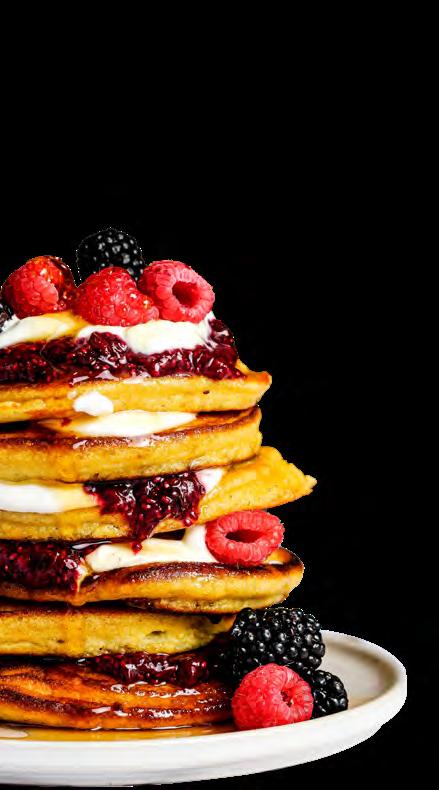

Power up your mealtimes by choosing delicious ingredients that boost your health. A new cookbook from Chai nutritionist Susan Fruhman shows you how
n her 14 years as a nutritionist, Manchester-based Susan Fruhman has worked with a range of patients including those with cancer and chronic fatigue. Her extensive nutritional studies have taken in complementary healthcare and it’s from this broad base that she developed her ethos of using food to build health-giving value into every meal.
‘I believe food is medicine,’ she says. ‘For someone dealing with a cancer diagnosis and treatment, eating can become a minefield as the palate and appetite change. At such a critical time, people want to help, of course. But clients tell me that often means being plied with sugary, sweet foods which, though tempting, don’t add nutritional value for someone who is unwell.’
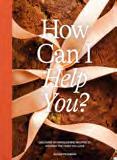
How Can I Help You? by Susan Fruhman, £35, is available at Chai centres and to order (+P&P) from susanfruhman.com

Susan’s answer to this frequent scenario is contained in her new (and first) cookbook, aptly titled, recipes are designed to get tastebuds firing and pack in tons of health-boosting ingredients along the way. ‘Armed with this book, if a willing partner, friend or auntie wants to do something really helpful, the patient can ask for the salmon and tahini dish or the chickpea pancakes with scrambled eggs, or even the dark chocolate orange brownies. After surgery or treatment, it’s empowering to have some control to help you eat better and maximise your health potential.’ According to Cancer Research UK, maintaining a healthy diet tends to lessen the impact of side-effects when going through cancer treatment.
But this isn’t only a cookbook of delicious recipes for cancer patients. It’s invaluable for any household, with a chapter on healthy essentials relevant to us all – whether you’re feeding a young family or an octogenarian. Having been successfully tested by
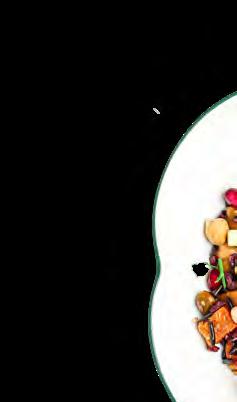
clients, friends and family, Susan is confident there’s a dish to satisfy everyone among the 130 recipes. ‘Keeping mealtimes simple when the household can feel quite chaotic because of a cancer diagnosis, is another win,’ she says. ‘Even the act of sitting round the table with family or friends, is calming and healing.’ It could well become a kitchen favourite.
For details of our nutritional therapy service visit chaicancercare.org or call our Freephone Helpline 0808 808 4567.
• 1/2 cup coconut flour
• 6 large eggs
• 4 tbsp olive oil, plus extra for frying
• 4 tbsp maple syrup
• 2 tsp baking powder
• 2 tsp vanilla extract
• 2 pinches Himalayan salt
1. Whisk together the ingredients in a medium-sized bowl to a smooth consistency.
2. Warm a small frying pan to a medium heat and brush with a little olive oil.
3. Pour 2 tbsp of the mixture into the pan, spreading it slightly. (It won’t cover the whole pan.)
4. Let cook for 5 minutes until the bottom of the pancake is set.
5. Flip and cook for a further 2 minutes until cooked through and fluffy.
6. Slide onto a warmed serving plate while you repeat with the rest of the mixture.
7. Serve with Greek yogurt, a sprinkle of berries and a drizzle of maple syrup.
• 1 cup black rice
• 1/2 cup wild rice
• 1/4 butternut squash, cut into 1cm pieces
• 1/2 cup olive oil
• 3 tbsp apple cider vinegar
• 2 tsp raw honey
• Seeds from 1 pomegranate
• 400g tin of organic chickpeas, rinsed and drained
• 1 bunch parsley, finely chopped
• 1/3 cup shelled, roasted pistachios
• Sea salt and freshly ground black pepper
1. Preheat the oven to 220°C.
2. Boil the black and wild rice together for 35–40 minutes until just tender, or according to the packet instructions. Drain, rinse and leave to cool on a baking sheet.
3. Meanwhile, spread squash on a baking sheet, sprinkle with 3 tbsps olive oil, toss to coat and roast for 25 minutes, turning once or twice, until golden brown. Leave to cool.
4. Whisk together the apple cider vinegar, honey and remaining oil in a small bowl.
5. To assemble, put the rice, squash, pomegranate seeds, chickpeas, parsley and pistachios in a large bowl. Pour over the dressing and season with salt and pepper to taste.
Health tip: Black rice has a low glycaemic index causing a slower increase in blood sugar levels. It’s high in antioxidants and fibre, iron, manganese, zinc and phosphorous. Wild rice is a type of grass seed that’s gluten-free with a chewy texture and nutty flavour.
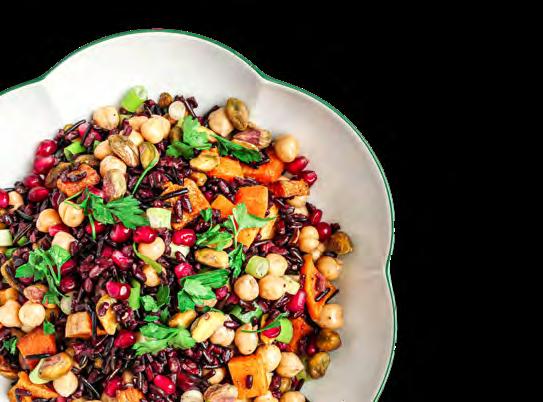
• 1 cabbage leaf
• 3 slices of fresh pineapple
• 2cm ginger root
• 6–8 mint leaves
1. Chop and juice all the ingredients.
2. If preferred chilled, add some ice.
Healthy tip: Cabbage is high in glucosinolates which improve the body’s ability to eliminate harmful chemicals. Pineapple is rich in bromelain, which aids digestion and reduces swelling and inflammation. Ginger helps reduce gas, as does mint.
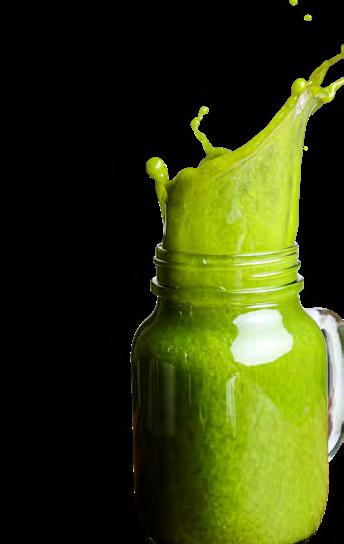
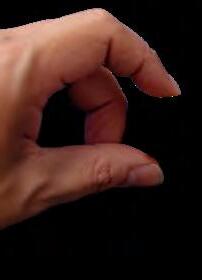
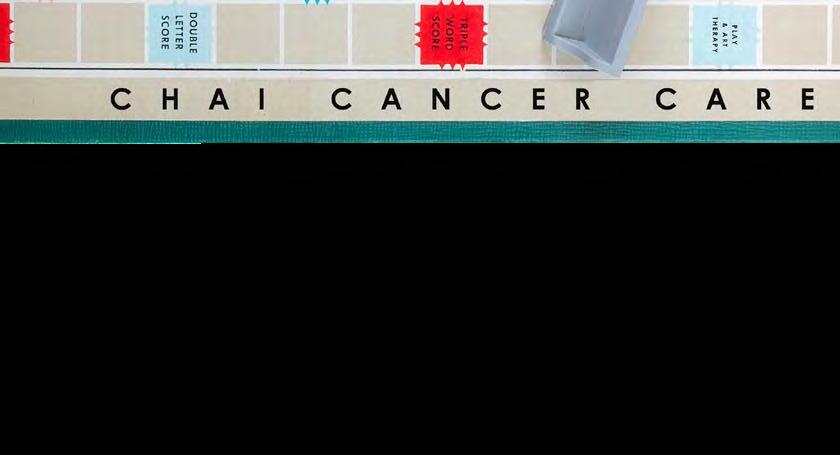
















The emotional ups and downs caused by cancer can make communication between family, friends and colleagues difficult. Chai counsellors suggest some ways to keep the dialogue going
The first conversations
‘We are much better at speaking about cancer than previously,’ says Chai counsellor, Daniel Glass. ‘Nevertheless, when there’s a diagnosis in the family, there are a lot of assumptions we impose that can obstruct communication.’ He continues, ‘For example, assuming a loved one will be upset if we raise a particular subject or indeed, if we don’t. It may be that both parties do want to talk but don’t know how.’ Daniel believes noticing how difficult it is to find the right words is the first step to thinking about new ways to articulate. ‘It takes courage but is a more positive approach than falling into silence and fear.’
When it comes to breaking bad news, he acknowledges this can be an exceptional demand. ‘You don’t want to shock people, yet you must make them aware.’ He suggests how much you say can be based partly on what you think the other person can take and would want to know. ‘One opening could be, “I have to talk to you about something that’s quite difficult.”’ Daniel encourages establishing an open, kind dialogue with loved ones from the start so that understanding is in place. ‘It means you can test the waters even if the words come out clumsily. For example, “I don’t know how exactly to put this, but I notice we haven’t talked about how you’re feeling emotionally/physically since your operation/after your last chemo. Do you want to?”'



Discussing the physical impact of surgery and treatment is another area where people can become inhibited with words. Going through surgery, such as a mastectomy, prostate or bowel surgery, a person has to re-establish the connection with their own body and the changes to their intimate relationship, both emotionally and physically. There can be sadness and shame on the part of the patient. For the partner, especially, there may be hesitancy over showing affection at such a sensitive time. Says Daniel, ‘A way to raise the subject could be for the partner to say, “I’d like to give you a hug.
We were able to help the couple get past this block to make the last months and days more meaningful to both.’”


Please tell me if that's okay."'
Better left unsaid. Or not?
When cancer happens alongside an already-
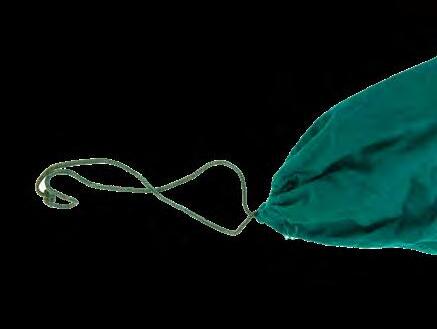








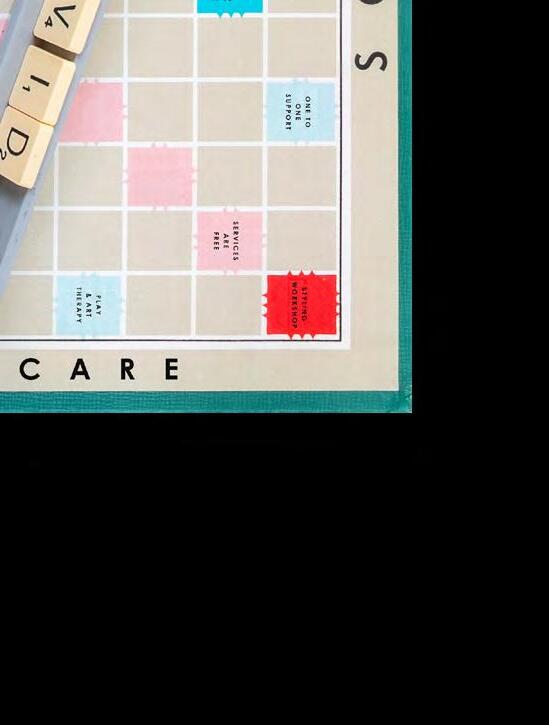
When you can’t fix it
Feeling powerless to make it better for the patient or their loved ones is a common theme. What can one say? ‘Just being able to acknowledge you can’t change the situation, but being there physically, to sit and listen, that’s really valuable,’ reassures Daniel. Differing emotional responses between otherwise-loving partners can risk a breakdown in communication just at the time channels need to remain open. Shoshanna cites an example where a husband became ultra-focused on practical issues, leaving his terminally ill wife hurt and confused by seemingly cold behaviour.
‘Problem-solving was his way of coping with the pain of impending loss but his wife needed gentler words and loving gestures. In counselling, we were able to help the couple get past this block to make the last months and days more meaningful to both.’
The one left behind





‘It’s important to be honest with children when there is a cancer diagnosis in the family,’ says Darit Puchkov, a play and creative art therapist at Chai in Hendon. ‘What matters most, however, is using age-appropriate language because what you say to an older child will be different than for a younger one.’
The approach she recommends is for parents to drip-feed information in digestible pieces. ‘Start with: "Mummy (or Daddy) is going to the doctor/to the hospital." Return to the subject when you need to "Remember I told you Mummy has to have an operation? Well, when she comes out, she’s going to be very tired." Further on… "Mummy is still very unwell, the medicine she was taking wasn’t helping, so they’re trying a different one." 'Reassure where you can,’ says Darit, ‘but don’t lie, because that risks losing the child’s trust. Instead try, ‘Mummy and Daddy are getting the best medicine possible to fight it."’
Heart-to-hearts are best when children aren’t tired, hungry or occupied with something else. "Go for a walk together, get an ice cream, create a space where you can bond. The aim is to be positive but realistic," says Darit. Chai counsellors can help parents prepare to speak to their children. Books, such as The Cancer Party, The Invisible String and Badger’s Parting Gifts also offer helpful terms to adopt with very young children in different scenarios.
Reassure where you can,’ says Darit, ‘but don’t lie, because that risks losing the child’s trust.”
The grief of losing a spouse or partner can often be compounded by friends who suddenly fall quiet because of their own discomfort. ‘In this fragile time, it’s a lifeline to have friends who are not avoiding or ignoring you,’ says Shoshanna. ‘Show them they are still part of your life by including them as if their partner was still alive. Invite your friend out for a walk/swim/coffee/dinner. Remembering and referring to their other half with sensitivity, can feel very healing.’
For details of counselling services for adults, couples and families, visit chaicancercare.org
Parenting roles often swap during illness. ‘Despite that, children still need boundaries,’ asserts Darit, ‘so try and keep to some kind of routine which will help children to regulate. Frame any changes in a positive light, for example, "While Mummy’s recovering, you can go on play dates in the afternoon, because we want you to have fun."’
If the prognosis is not good, Darit highlights the value of parents and children creating a memory box together when precious conversations can take place as photos and mementos are gathered. ‘You can share memories of holidays, when their little sister arrived, their birthday parties – and you don’t have to mention the inevitable. It can simply be about making a special gift for Mummy/Daddy.’




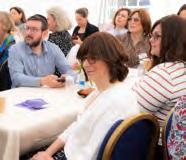

Chai CEO, Lisa Steele, reviewed a year of expansion for services and staff
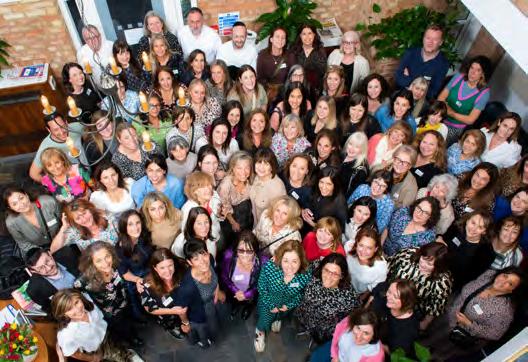
Dr Ellie Cannon talked about how cancer patients can get the most from their GP surgery
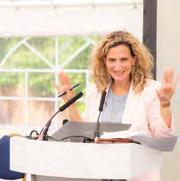

From across the land, the Chai family gathered in London to connect and be inspired by a day of powerful, uplifting and motivating moments. Most of all, it was a chance to say ‘thank you’ to the extraordinary people who give their all to our clients every day
On one of the few sunny June days, Chairman Louise Hager welcomed almost all the members of the ‘Chai family’ to our flagship centre in Hendon. The ‘deeply valued and beloved’ teams travelled from Glasgow and Liverpool, Leeds and Manchester, Hackney and Hendon… 105 (of 130) people who, for so long, had only encountered each other for a quick ‘hello’ between appointments or online. Finally, some real ‘face-to-face time’ and as everyone connected, the joy, warmth, and spilling over of emotion, was palpable.
For many working in Chai satellites outside of London, it was also their first opportunity to connect to the ‘mothership’. Touring the building, one team member enthused, ‘This is rocket
Photography Alexandra Taibel
fuel to take back,’while another said, ‘I truly feel part of the team now.’ Those who have recently joined the team heard the founders’ story of the two passionate and committed women – Frances Winegarten z’l and Susan Shipman Zuckerbrod – who 34 years previously, understood the impact of a cancer diagnosis. ‘They represent the heart and soul of the organisation,’ said Louise. ‘Now, all these years later, Chai is a blueprint for personalised support that reaches across the community and further.’
That model had been recently presented to 25 MPs from five political parties at a drop-in session at the Houses of Parliament. Louise also paid tribute to CEO Lisa Steele and the client
services team. ‘It’s a privilege to see this specialised care delivered from the heart, every day.’
Then it was over to London GP, journalist and TV medic Ellie Canon who gave insights into what patients can ask of their GPs during the cancer process, highlighting important services, and alerting the room to the difficulty of the under-50s getting referrals. Ellie also addressed the concerns of Chai counsellors and client services managers about patient access, as a picture emerged of contrasting GP experiences around the country.
Lisa Steele presented a strategic overview of Chai. With client numbers on the rise, there were new management roles in London, the North

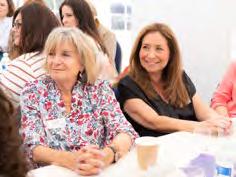
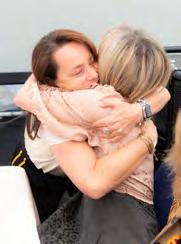
Chai time! Teams serving clients in Glasgow, Leeds, Liverpool, Manchester, Birmingham, London –and the world – listened, learned, laughed and bonded
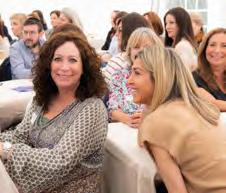
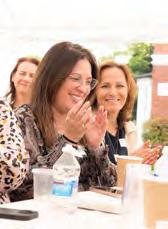
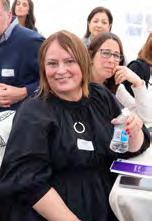
West and Scotland; additional services to reflect changing demographics, greater Chai in Schools support, the success of NHS England’s Jewish BRCA Testing Programme and the services Chai is providing for those testing BRCA-positive.
Spirits were maintained with a truly scrumptious lunch, ahead of the part of the day that strikes fear into away-day participants: team-building exercises! Under the captaincy of global adventurer Paula Reid, no one needed to worry. Paula’s ‘adventure psychology’ aims to energise physical and mental muscles to help individuals and organisations adapt and thrive through change; something as relevant to Chai staff as to their clients whose lives are so tested. She recounted in
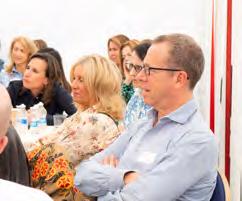
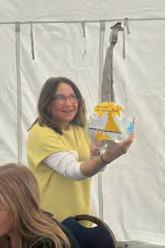
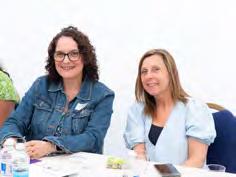
lively terms the literal ups, downs and overboards of the thrilling, 10-month, Global Challenge yacht race which set her on her career path to help others discover their personal and team strengths. Happily, no one met a watery end. Instead there was an exercise to build the biggest, best and most unique model boat… a challenge as old as the ark. As always, Chai delivered!
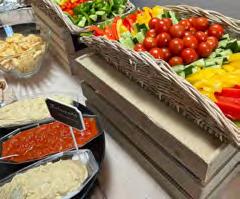

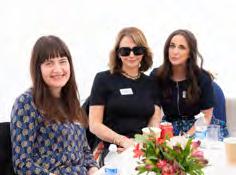
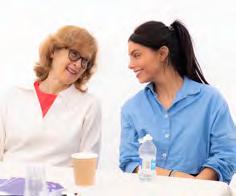

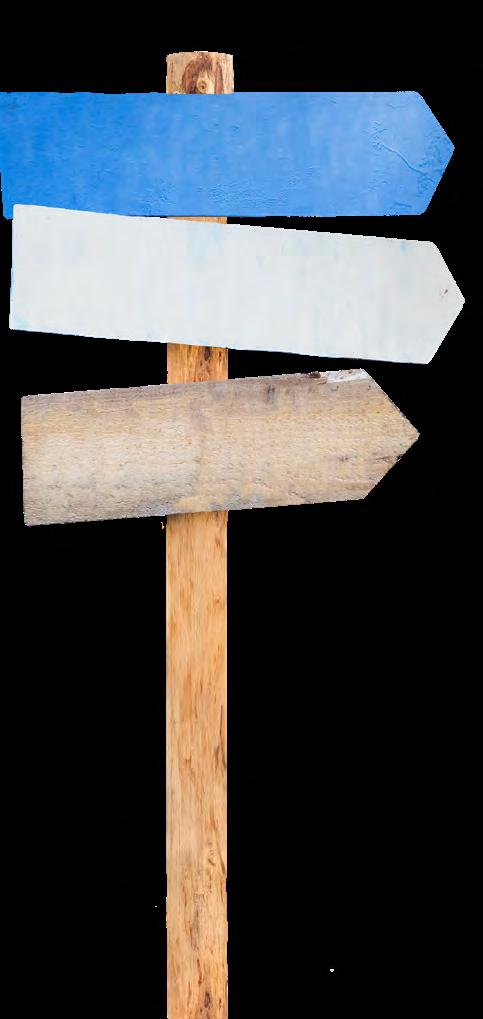
The lynchpin between the cancer patient and their medical team is the Clinical Nurse Specialist. Guida Kurzer, RN, BSc explains the multi-faceted role and its importance in delivering supportive care
hat does a Clinical Nurse Specialist (CNS) do?
A CNS in the UK has completed advanced education and training to practice in a particular clinical specialty, such as cardiology, oncology or mental health. CNSs are champions of patient-centred care, providing expert clinical support to patients, often managing complex cases and collaborating with other healthcare professionals to develop and implement care plans. As a CNS, I also have a key role in educating and training other healthcare professionals, such as nurses and junior doctors.
What is your speciality area?
I work in London in the Gynaecology Oncology Unit at Barts Health Trust. We provide a specialist service for women with an increased risk of developing a gynaecological cancer, either because of a strong family history or a genetic mutation. Some women are referred for genetic testing after being diagnosed with cancer of the endometrium (womb lining) to test for Lynch syndrome, a genetic mutation which increases the risk of certain gynaecological and bowel cancers.
Where do you fit into a patient’s cancer care team?
I am part of a multidisciplinary team led by a professor of gynaecological oncology, and made up of research doctors, a psychologist, two CNSs and a specialist in menopause care and fertility. CNSs are present at the time of diagnosis and form the liaison between the patient and other members of the healthcare team. We look after adult women of all ages and the heart of my role is to be an advocate for the needs of my patients, ensuring they receive holistic care that meets their individual needs. Patients may have been referred directly to our service by one of the regional genetic centres, or by their GP or other medical services.

What does ‘being an advocate’ for the patient involve?
I meet patients early on to listen to their personal history, and together with other members of the team, we advise on which options would be most suitable for managing their cancer risk, considering their medical history, age and genetic make-up.
Understandably many women are anxious, and my aim is to allay their concerns and dispel any misinformation they may have. It can be helpful to come to the consultation with a friend or a family member as the questions and answers that arise are varied and at times complex – a second pair of ears is useful. The cultural background of each woman, their belief system and language will also affect the decision they make, so we always take this into account.
How do you support patients to make decisions about managing their cancer risk?
We look after women who have a significant family history of cancer or those who are known to be carriers of a genetic mutation that increases their risk. The options include surveillance (screening through regular testing), preventative measures such as lifestyle changes and medication, or risk-reducing surgery (for example, removing ovaries that are at high risk of developing cancer). To further determine someone's risk, we might recommend genetic testing, imaging (taking a scan) or blood tests. I will coordinate with healthcare providers to ensure timely, appropriate followup for these tests. We also highlight to patients any suitable opportunities to participate in clinical trials.
If a woman opts for risk-reducing surgery, we encourage her to take time to discuss this with family and friends before making her choice, to ensure she is comfortable with her decision. Cases of women opting for this type of surgery are discussed at a monthly multi-disciplinary team meeting (MDT) where other teams from around London also present cases. This gives independent validation to our care plan as well as the opportunity to discuss more complex cases. All premenopausal women who have opted for risk-reducing surgery are given HRT (hormone replacement therapy) following surgery, if it is considered safe for them.

explain their significance. Normal findings provide valuable reassurance but if the results show an abnormality, I discuss this with a senior doctor from the team and we devise a management plan for the patient. Throughout this process we ensure that our patients have direct access to one of the CNSs via email or phone to ask any questions.
For some patients, joining a support group to share experiences and hear from others is a crucial part of their management, so in our conversations I signpost these external services, community resources and online forums.
In the Jewish community we are incredibly fortunate to have Chai as a central support for cancer patients and their families. The recent launch of the Jewish BRCA programme has shown how the community benefits from the support of charities such as Chai.
Why is this role important to you?
When I say I’m a nurse, people often think of the stereotype on a Victorian ward tending to patients’ needs –the classic Florence Nightingale image!
The cultural background of each woman, their belief system and language will also affect the decisions they make” “
That’s how I started out in the 1980s at the Whittington Hospital. Now, my workdays and clinical responsibilities are very different. I play a pivotal role in the holistic management of women who are BRCA-positive or Lynch syndrome carriers. It is challenging and can also be emotional when a patient does not do well, although it is incredibly rewarding to see women recover or manage their difficulties with the treatment and the support I provide. I cannot think of another job I would rather do.
Tell us more about the emotional aspects of patient care
A key member of our team is the psychologist who meets with women needing additional emotional support to cope with anxiety or to help with decision-making. As a CNS, I am available to offer emotional support or counselling to help address feelings about a diagnosis or treatment plan. I contact patients with the results of any of the tests and
“ CNSs offer emotional support or counselling to help address feelings about a diagnosis or treatment plan”

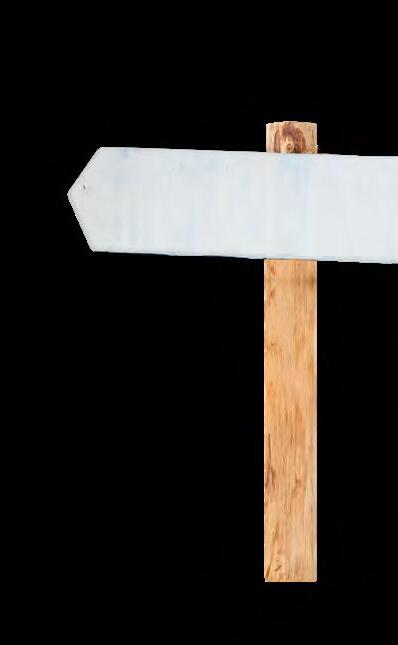
Guida Kurzer RN, BSc is a clinical nurse specialist (CNS) in the department of Gynaecological Oncology at Bart’s Health NHS Trust. She has worked at several London teaching hospitals in a wide variety of settings, such as benign gynaecology, gynaecological cancer, menopause clinics, family planning, and clinical research. Her interest is cancer care and women's health, including fertility, menopause, recurrent miscarriage and natural labour.
Strengthening the 'hammock’ of muscles in the pelvic area supports the internal organs and can reduce the impact of surgery on daily life
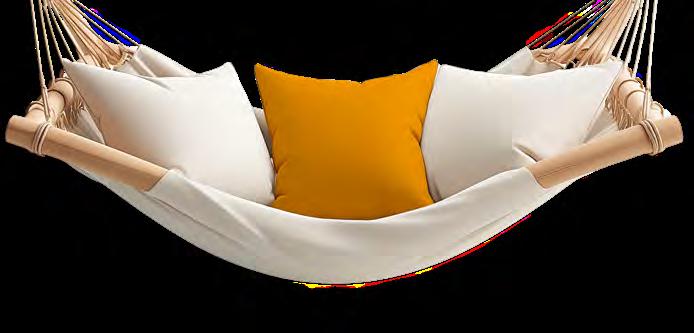
Cancer surgery and radiotherapy in the pelvic area can trigger distressing side effects affecting bladder, bowel, and sexual function. A new service is helping clients address these problems
Imagine if every trip out of the house meant running the gauntlet of being caught short for the loo. Even a local supermarket shop would be fraught with risk. Yet a restricted everyday life is a scenario that some patients face after cancer surgery and radiotherapy treatment in the pelvic area. Damaged tissue can affect bladder or bowel control while men’s sexual function can also be compromised. The potential physical and psychological upset is immense.
Overcoming embarrassment
Ilana Kyte is a pelvic floor physiotherapist at Chai working with clients to restore the strength and flexibility of their pelvic floor. ‘It’s a common misconception that only women have a pelvic floor,’ she says. ‘The women I see may have gone through bowel, bladder, cervical or ovarian cancer; maybe they’ve had a hysterectomy. Men with these problems may have had prostate, bowel or bladder cancer treatment,’ says Ilana. ‘There’s so much that can be improved by training the pelvic floor, even for those who’ve been struggling for a long time.’ By introducing this new service, Chai aims to destigmatise the issue and overcome embarrassment by providing a practical solution.
Getting a grip
First comes a comprehensive verbal assessment. ‘I learn about the client’s lifestyle: what they eat and drink, how often they go for a wee and empty their bowels,’ says Ilana. ‘I get a picture of daily life and what’s bothering
them: frequent visits to the loo, constant leaking, pain – it’s different for everyone.’ Next, an internal examination helps Ilana determine how the client’s pelvic floor is behaving and she introduces them to the complex ‘hammock of muscles’ that supports all the pelvic organs.
Clients receive a tailored programme of exercises combined with lifestyle adaptations" “
‘The physical assessment tells me if it’s weak or strong, flexible or too rigid,’ says Ilana. Surprisingly, a tight pelvic floor is as unhelpful as a weak one. Ilana teaches clients to activate the ‘biting point’, when you halt the urge to pee by engaging the pelvic floor muscles, and use them to bring back control.
Clients receive a tailored programme of exercises combined with lifestyle adaptations such as what foods to avoid, how much and when liquids are taken on board, even scheduling loo stops. ‘These steps can make a dramatic difference. When someone who’s been incontinent for 20 years now goes to the loo twice a night instead of five times – that’s a fantastic achievement!
‘Some people will already have practiced pelvic floor exercises and that will certainly help the recuperation,’ adds Ilana, ‘and psychologically it encourages a person to feel more empowered.’ She may recommend probiotics to improve gut health and digestion alongside the pelvic work. ‘When people see improvements, it’s hugely motivating,’ she says. She is frank however, that these are exercises for life. ‘There won’t be a shift in a week, but over six months, you will absolutely see that change and it can transform your life.’
‘Following treatment for prostate cancer, I didn’t quite know how anyone could help me with the terrible aftereffects. So, what a wonderful surprise! The pelvic floor exercises have made a great deal of difference, combined with a probiotic medication to improve my gut health. It’s been totally life changing and I couldn’t have done without Ilana and Chai.’
For more information about Pelvic Health Physiotherapy, please email charlotteh@chaicancercare.org or call Charlotte Hildebrand on 020 8457 3238
Each year our Rosh Hashanah cards carry wishes for a healthy, happy and peaceful new year to more than 20,000 people. Here, we share the personal and profound stories behind the designs
Back in 2013, a Chai client received a Rosh Hashanah card on the day of her cancer surgery. She kept it by her bed in hospital, telling us afterwards, ‘It was so bright and cheerful. It lifted my spirits and gave me courage and strength when I needed it most.’
This anecdote beautifully illustrates the ethos behind the design for the annual card, which is selected from works created by Chai clients who attend art workshops. ‘It’s no wonder the artist understands the positive power of art,’ says Linda Sharpe, who is head of the art department and began the Hendon group 20 years ago. ‘Using colour and imagination, clients express emotions, discover creativity and escape the negativity that can surround a cancer diagnosis. There’s the personal sense of achievement and self-worth when their design is chosen. More than that, it’s the chance to give back and share Chai’s message of care and support for the community.’
The brief is simple: to create an image that reflects warmth, light, joy and hope at this special time of year, and the tangible impact Chai support has on our clients. Every image is profoundly personal and there are innumerable stories of resilience and optimism attached to them: the card produced jointly by a father going through treatment, and his daughter; a table set for the chag representing togetherness in contrast to cancer’s isolating impact. One client even worked on her design while having chemotherapy, asking the nurse to insert the canula in her other arm so she was able to draw.
A quote from the artist always accompanies the image explaining the sentiments and inspiration behind their design. Of this year’s ‘Tree of Chai’, artist Elaine Arenson, says: ‘Being part of the art workshop shows us we are so much more than a diagnosis – that’s the miracle of Chai.’

2023 This vibrant image reflected the artist’s connection between the notes of the shofar and the myriad emotions following a cancer diagnosis.
By Etty Debourcieu
2022 ‘A dove is a symbol of hope and freedom. In the Chai workshop we are free to express our feelings and feel uplifted by the group.’
By Sharon Wakefield z’l


2016 Painted by a client in tribute to her late daughter who loved sunflowers. ‘As the sunflower turns towards the light, we turn to Chai which brings light into our lives.’
2011 The work of a father who was going through treatment, and his daughter, who together found a creative outlet in the art workshop.





2013 ‘Chai understands we are all different and have our own specific needs.’
By Ilana Mocatta
2010 For Chai’s 20th year, a watercolour of the Hendon centre where the doors are ‘open to anyone in the community… where we find expert care, warmth, strength and support.'
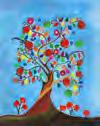
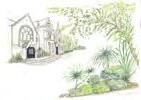
2024 ‘This is my tree of Chai, my tree of light. Through the art group, we find creativity, renewal, community and exceptional care. We discover we are so much more than a cancer diagnosis.’
By Elaine Arenson
SEND A CARD AND SUPPORT CHAI
Our Rosh Hashanah cards not only deliver your good wishes but are also a significant source of income for Chai. They are available to buy blank or with a printed message, and as e-cards. To purchase, email jackistanton@chaicancercare.org or call on 202 8457 3231.
Art workshops run in the Hendon and North Manchester centres. For details email (London) charlotteh@chaicancercare.org or call 020 8457 3238 (Manchester) amanda.newdall@chaicancercare.org or call 0161 772 4064.
Let’s look back over 12 months of baking, gift buying, spieling and performing, dancing and remembering
Upwards of 1000 people came to shop and support the Chai Rosh Hashanah Gift Sale, which raised £38,000. Best friends Debra Zender and Julia Abrams have been at the helm for 11 years, raising more than £400,000 in total. This year, their efforts for Chai won them a JVN award (see p37). Debra (below right) sets out her stall…
Q: What’s your formula for the success of the gift sale?
A: We’re always innovating, introducing fresh and exciting ideas and vendors to delight shoppers. Last year, we welcomed make-up artist Dani Levi with her cosmetics range, Matchbox Jewellery’s clever mix-and-match designs, and Soxygen’s luxury organic socks. There are returning favourites too: Tracy Hillel Millinery, Juma Candles and Amber Rose Flowers. Homeware for Chai’s stand is sourced from around the world, and we ensure every pocket is catered for with gifts starting from £5. Tony Page’s generously donated honey cakes go in a flash, and I’m thrilled by the popularity of the Crave and Oh Brown Bear food trucks, which are now a destination for all ages as they shop, eat and socialise.
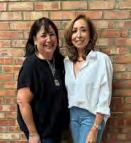
It affected my parents before Chai was around, so it means a lot to me. I wanted to volunteer, and the gift sale uses my background and experience in wholesale jewellery – I have an instinct for what sells! Chai’s CEO Lisa Steele asked me to come on board and the rest as they say… I am so honoured to be part of such a special charity and feel a huge responsibility to do my utmost for Chai.
Q: What’s the build-up like to the gift sale?
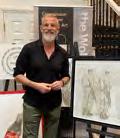

A: Believe it or not, this is the culmination of an event we start planning in January! It always feels like a first night opening. I’m full of nervous energy, wondering if anyone is going to come. Then, seeing people flood through the doors, I get very emotional. There’s an unbelievable buzz that goes through the centre, everyone is smiling, and we see the positive response to what’s on sale. Julia and I always say it's a privilege to do what we do, even with the stress levels that go with it! We are a great team.
Q: How does Chai benefit from the gift sale?
A: All profits from Chai’s stand go direct to Chai, while the vendors give a percentage of their takings to Chai. Another huge benefit is that people come to the Hendon flagship who might never have been before and see the beautiful environment and amazing facilities, and how it supports people at their lowest ebb.
Q: Where does your commitment to Chai come from?
A: At some point, cancer is going to touch all our lives.
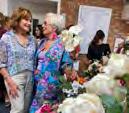
Q: Who else is involved in the gift sale?
It’s quite a tight ship, though it’s a mammoth operation of logistics, planning, liaising with vendors and stocking up with everything we need! I must mention Paulette Sachon who runs the front of house team, taking entry money, directing visitors, selling raffle tickets, and troubleshooting as needed! Huge thanks as well, to our fantastic volunteers who help on the day and, of course, we are extremely grateful to our wonderful, loyal sponsors, Roundtree Real Estate.

The success of Manchester’s annual Kids Artisan Market for Chai grows. This year, 35 junior entrepreneurs set out their stalls in St Mary's Park in Prestwich, offering toys and baked goodies, jewellery and personalised Magen David string bracelets, glitter tattoos and hair braiding. To nosh, there were sweet cones and chocolate-coated strawberries and visitors could get their photo taken with a pet snake and lizard. The event raised £1,200.
The Jewish Nurses and Midwives Association provides advice to its 100 members, all of whom work within hospital and social care settings across the UK. In its first meeting since Covid, attendees heard speakers from the medical and charity sectors including Chai’s Louise Hager The group includes men and women from across the religious spectrum.
In honour of Volunteer Week 2024, we hosted a cream tea for our fantastic volunteers, who are such a vital and valued part of our team. More than 40 attended the event with special guest, British comedy writer and author, Ivor Baddiel, who also facilitates Chai's creative writing workshop.

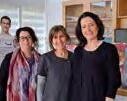
Chai's North West centre at the Heathlands Village hosted a spa, style and art event. Supporters enjoyed tasters of restorative services provided to clients. There were children's art activities, and paintings by clients attending the art workshop, on sale. North West Head of Fundraising Jilly Berens said, ‘The morning encapsulated Chai: services that make a difference, delivered in a beautiful space that does so much to restore clients’ wellbeing.’
Much-loved designer James Lakeland’s clothes definitely have the wow factor. Imagine how wowed we were when the store in Pinner held a sale in aid of Chai, which raised £304
Thirty Year 7-9 pupils from several schools joined forces to make up hundreds of treat bags for Simchat Torah filled with biscuits, sweets, fruit and colouring pencils for young clients supported by Chai and GIFT (which distributes food packages to the vulnerable). Volunteers heard from Caroline Tunkel, Chai’s Head of Community Enagegment and Barry Coleman, GIFT’s Secondary Schools Manager, whose family was supported by Chai when his father was ill. ‘It was very special to see so many students engaged in volunteering,’ he said.
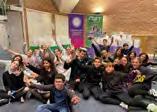
Chai played host to 15 sixth formers from a number of schools at its inaugural workshop designed for students studying psychology A-level. The half-day event included talks and interactive sessions with counsellors, therapists and staff who offered insights into their professional worlds.
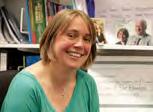
Professor Ruth Plummer (right), Professor of Experimental Cancer Medicine at Newcastle University, delivered the 2023 Natalie Shipman Memorial Lecture on the theme of ‘Taking new cancer drugs to the patient’. The lecture explored how new drugs are found; the trial stages and the challenges involved. Said Professor Plummer, ‘These patients are prepared to take something experimental. It’s an incredibly generous thing to do and they are really contributing to research.’ The Professor also spoke about her work at The Sir Bobby Robson Foundation in collaboration with Cancer Research UK Newcastle Cancer Centre, where more than 1,000 patients are on drug trials.
Chaired by Chai Trustee and chair of the Medical Advisory Panel, Dr Adrian Tookman, the lecture series is in memory of Natalie z’l (right), daughter of Susan ShipmanZukerbrod, Chai’s founder president. Natalie sadly passed away from a brain tumour just before her eighth birthday.
More than 200 people tuned in from around the world.

Mazel Tov to all those celebrating with Chai in their hearts
Freya Forman showed her giving nature when, for her Bat Mitzvah, she set up an Amazon Gift List which she sent to friends and family so they could purchase a Chanukah present for a young Chai client going through tough times. Freya wrapped all the gifts beautifully for each recipient.
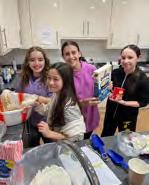
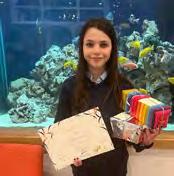
The tradition of Mishloach Manot is to give gifts of food for the Purim feast. Our Chai Mitzvah girls – Ariella Ellis, Jemima Gillis, Stella Moss and Talia Woolfson – baked delicious cookies, which were packed by volunteers Stacey Vecht and Mirelle Kruskal, into special boxes for our youngest clients.
A fleet of volunteer drivers then delivered the gifts.
In celebration of his Bar Mitzvah, Ethan Hildebrand chose to learn more about the work of Chai and help with preparations for the Maccabi Fun Run. ‘I packed 100 snack bags for Chai’s runners to keep them going so Chai can keep going for those who turn to them. You inspire me with your amazing work!’ Ethan also donated a shofar to our music therapy room in Hendon – a precious addition.
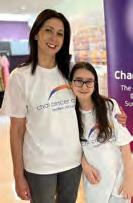
For her Bat Mitzvah ‘give back’ to Chai, Charlotte Cosgrove and mum Caroline, hit on the idea of developing a pre-loved Bat Mitzvah dress re-sale market. Says Caroline, ‘They can cost £100s and it’s crazy to spend so much money for one night. Chai supported Charlotte's grandma, June Christie, who died in 2011 shortly before Charlotte was born. Linking Charlotte’s Bat Mitzvah to raising money for Chai feels meaningful and connecting.’ The response to the call out for dresses was overwhelming.‘We made £1,590 and are so pleased the idea is being taken forward by Chai.'
Ella Behar volunteered at Chai’s Kid’s Campaign Day and also raised money for Chai and Camp Simcha. ‘Both are close to my heart as immense supports to my family and friends,’ says Ella. ‘Chai was there for my grandma and continues to be so for my family.' £1,183 was donated to each charity.

Jacob Krotosky devised a brilliant set of 13 challenges to mark his Bar Mitzvah year. They included climbing Mount Snowdon, volunteering for local charity Give. Help.Share., staying silent for 13 hours on one day during the summer holidays and learning to count to 13 in Welsh. He then chose 13 charities to donate to, including Chai which received £153.
‘I’ve never climbed and scrambled up a mountain before and it was certainly one of the hardest things I have ever done,’ said Amelie Teacher after she and dad Jeremy ascended two Lake District peaks with Bnei Mitzvah Challenge ‘I loved the experience of being on top of the world!’ said Amelie who did the climb in memory of her grandma Hilary Newman, and raised £775
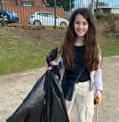
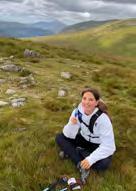
Gabriela Emanuel completed 12 very different activities for her Bat Mitzvah challenge to raise funds for Chai. Her creative take on these included tidying 12 parks with a litter pick, giving 12 people a style makeover, creating a character for and designing a children’s book, and saying ‘hello’ in 12 languages! ‘I chose Chai because it helps people like my grandma and their families who go through cancer. I’m very proud of what I did.’ And so you should be Gabriela, after raising £1,397.
Reuben Goodman found walking Hadrian's Wall an incredibly fulfilling Bar Mitzvah challenge experience. It was a way to honour his late grandma, and to raise money for Chai. ‘The physical demands of the journey mirrored the resilience and courage she showed during her cancer battle,’ says Reuben who raised £3,721. ‘It was a meaningful tribute to her memory.’
Chai’s CEO, Lisa Steele spoke at a Barnet Wellbeing Service event, sharing information about Chai's services with healthcare professionals and care providers. Lisa said, 'We feel very fortunate to have this sort of service available in our community.'
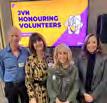
Chai’s outstanding volunteers swept up a clutch of awards at the annual Jewish Volunteering Network awards ceremony this year. Worthy recipients included ‘dream team’ Debra Zender and Julia Abrams who run the unmissable Rosh Hashana Gift Sale (see p34). Equally worthy was Jo Fogel, recipient of a lifetime achievement award for her work on the Golf Fore Chai Committee – every tournament is delivered with originality and finesse. Ken Ornstein, Chai’s very own ‘superhero’, was also recognised for his work as a befriender since 2013, helping clients with shopping and transport, as well as raising money.
Two groups of JFS A-Level students were welcomed to Chai for a Dragon’s Den-style workshop in partnership with the GIFT charity and Tribe, aimed at developing creativity and leadership in fundraising. The inventiveness and thoughtfulness on display impressed Chai hugely, with ideas that included 24-hour bakea-thons to a fashion show and dress sale of unwanted special-occasion dresses to raise funds for the charity.



Leading figures from NHS England, CEOs from national cancer charities and stakeholders from the Jewish community and beyond heralded the launch of this ground-breaking BRCA gene testing programme, which aims to reduce BRCA-related cancers (see p8).

Hosted by Chai and Jnetics, event co-sponsor, Lord Wolfson of Tredegar (right) spoke about the loss of his sister to a BRCA-related cancer and the potential of the programme to save lives. It was, he said, an ‘example of how the Jewish community can work together with a national organisation and be of benefit to both’.
Professor Peter Johnson, National Clinical Director for Cancer at NHS England, shared his delight at this ‘step change in dealing with cancer heredity’.
Chai supporter and whisky cask artist Jack Kay created a range of Judaica, including besamim boxes and plinths for kiddush wine. Hosted at Chai in Hendon, a raffle of Jack’s fine craftwork raised £795 for Chai, Magen David Adom UK and Jewish Care Scotland.

Forty talented Jewish artists featured in the Kinloss Jewish Art Fair. Red 'Sold’ stickers were plentiful and £1,300 was donated to Chai and Ezra Umarpeh. Thanks go to Trevor Gee and Israel Bonds for the refreshments and to organisers Jeremy Mindell and Committee members, Yvette Kamlish, May Sinclair, Susana Ross Cohen, Jonny Deal, Linda Brian, Fortunee Maltz, Lisa Harrison, Sharon Portner, Nicole Greenwold, Belinda Mindell and Stella Nemni.


At the helm of the project is Professor Ranjit Manchanda, Gynaecological Oncologist at Barts Health NHS Trust, and at the Wolfson Institute of Population Health. ‘Why wait for someone to get cancer?’ he asked, highlighting that 89% of Jewish BRCA mutation carriers in the UK are unaware of their status.
Speaking on behalf of Chai and Jnetics, Chai Chairman Louise Hager, said, ‘As engagement partners, we are committed to raising awareness in the community, before, during and after testing, so BRCA carriers can feel confident about the decisions they make at every stage.’
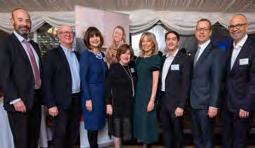
In January, Nicola Richards MP (below, far left) spoke of the work of Chai in the House of Commons during a debate on establishing a Jewish History Month. She detailed the services Chai provides to recognise the contribution of Jewish organisations to the nation.
In May, (on the day Rishi Sunak called the election) Nicola, here with Richard Holden MP and Mark Levy (right and far right), regional manager of the JLC, arranged a drop-in session for MPs to chat informally with Louise Hager and Lisa Steele, and hear about Chai’s ‘model of community-based support’. Said Louise, 'Despite the flurry of activity on a busy news day, 25 MPs from all parties made time to visit and find out more about our work.'
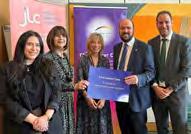
In the North West, loyal supporters Michelle and Mark Levine and Alex and Richard Caplan each hosted a ‘Parlour Evening for Chai’ in their homes. The informal evenings aim to share knowledge about services across the region. ‘The all-embracing heart of Chai really shines through at these events and tells the full story of this exceptional organisation. Many guests have no idea there are so many ways in which clients are supported,’ says organiser Lisa Cohen Nissan Clients spoke at the events alongside Louise Hager and Lisa, whose involvement with Chai is now in its second decade.

Ruby Collins, in Year 5 at Clore Shalom School, spent her summer baking cupcakes for neighbours, raising £66 for Chai. She’s a star baker.

The North Manchester Ladies Jewish Drama Group (NMLJDG) raised £250 for Chai with their original take on a classic children's film, renamed Chitty Chitty Balagan Show. Shelley Blackston from the NMLJDG said, 'Chai's guidance and advice is there for all of us so we wanted to give them our support.'
– incentivised!
Chai helped the festive mood by offering boys from Hasmonean High School the chance to customise a T-shirt with spray paint… if they spieled for Chai. Boy, did they fill their collection buckets! Special thanks to all our other spielers, especially Bertie Green who raised £8,000.
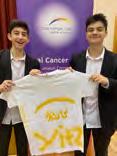

Inspired to support Chai for more than ten years now, Leeds resident Susan Dacosta along with the team at The Zone (the Leeds Youth Centre), hosted their third Leeds Conservatoire Choir concert in March raising £1,500 for Chai. Award-winning choir director Craig Lees presented a programme which crossed decades, from The Beatles to Natasha Bedingfield. Chai's Appeal video was shown, and Susan spoke about its services.
The Outlook Committee has raisied an astonishing £378,244 for Chai since 2003. So we knew their latest Bridge Lunch would follow suit (pun intended!). Indeed, they added £2,750 to their total sum.

Menucha, which supports Jewish women from the Charedi community, held a health and information day at Kinloss Synagogue. Chai was present, informing visitors about its range of services and the NHS BRCA testing programme in the community.


The Sherry Margolis Pre-Loved Clothes Sale gave her daughter Anna the opportunity to celebrate her late mother’s life and fashionable legacy. ‘Mum was renowned for her passion for fashion,’ says Anna (centre, with organisers Jo Gilbert and Beverly Barnett). ‘After passing away from ovarian cancer this year, close friends expressed a wish to have a keepsake to remember her by.’ The sale, which was beautifully curated and affectionately called ‘Sherry's Closet’ honoured what would have been Sherry’s 70th birthday, and raised £16,706, split between Chai and Ovarian Cancer Action.

Club 18 Golf pitched up at Dyrham Park Country Club for their ever-popular tournament. On a sunny day, 23 teams gathered to compete, which saw the winning men’s team of Gary Plein, Jeff Maze, Nimi Schwarzmann and David Lipsitz score an impressive 90 points. The top scoring women’s team with 85 points included Judi Lerner, Lindsay Blair, Karen Warwick and Hilary Abrahams while the mixed winning team of Gill Jaffa, Ken Jaffa, Denise Hoffman and Peter Hoffman achieved 83 points. Sponsored by the The Kirsh Foundation and Wilson Wright, over £51,500 was raised for Chai’s children, teenage and family service. Golf caps tipped to commitee members John Blair, Michael Davis, Michael Lerner, Michael Lubliner and Ronnie Gottlieb OBE

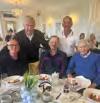
Chai and Acheinu Cancer Support hosted two Womens’s Health Awareness talks with consultant breast and oncoplastic surgeon Miss Joanna Franks and GP Dr Miranda Abraham. The women-only audiences in Golders Green and Stamford Hill heard about the latest research and practical advice on gynaecological health. To mark International World Cancer Day, an event was held at Hampstead Garden Suburb synagogue, when Miss Franks was joined by straighttalking GP and journalist Dr Ellie Cannon. The forums are an invaluable opportunity for open and informative discussion.
Two stars are born

The Lift Your Spirits event featured Danny Saltman of D S Tayman, showcasing his award-winning whiskies to a 70-strong audience of regular and new Chai supporters. Organiser Lisa Cohen Nissan and the Chai Girls committee ensured a lively blend of whisky, fun and fine food by Raisy at Best of Ushy. Entertainment featured the Jonny Cocktail bar crew and guests heard from volunteer Irving Modlin. ‘It was an outstanding evening which raised awareness and Danny’s generosity was exemplary,’ said Lisa.

The woman behind The Jewish Chronicle's popular column Secret Shulgoer was Rina Wolfson z"l. She wrote a powerful blog, Nobody needs another cancer diary before passing away in 2021. Being Rina was the subject of a session at Jewish Book Week in March, discussed by her husband Paul Harris, son BZ Gilinsky and JC managing editor Keren David. A percentage of sales went to Chai.
Last time it was chocolate, this time… cheesecake. Michael Leventhal, who with his mother Valerie z'l was supported by Chai, is producing another of his delectable cookbooks to fundraise for us. If you’ve got a secret cheesecake recipe for The Essential Cheesecake Cookbook, email info@greenbeanbooks.com
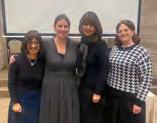
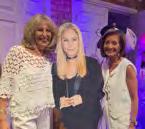
Andee Roback (left) and Lynne Silver (right) who created the vivid and tender show Dear Phylis which brings to life a woman’s wartime diaries, have devised another masterpiece, entitled ‘My name is Barbra and I want to be a star’. Of course, the subject is Barbra Streisand. Andee and Lynne, who run the Wednesday afternoon social club at the Hendon flagship, are gaining quite a following for their unique presentation style which meticulously blends biography and performance through dialogue and film. The June show raised £2,150. Along with their third show about The Beatles, the pair have raised more than £24,000 for Chai.
Passionate supporters Louise Harris and Ruth Gomm hosted a stunning Chai Tea for their friends and family to mark World Ovarian Cancer Day. These inspiring women raised more than £2,000
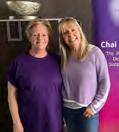

The Wednesday Afternoon Social Club knows how to celebrate. In summer that means a joyful party with an 'end of term' atmosphere. This year, clients kicked up their heels as Jonny Turgel sang, and all dipped into a sumptuous tea. In winter, Chanukah is festively enjoyed with donuts and candles. Andee Roback and Lynne Silver bring joy and community to people dealing with the impact of a cancer diagnosis with an eclectic mix of talks and activities.
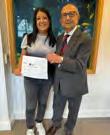
Father and daughter Jimmy Khazoom and Sharon Glick presented Chai with a £1,000 cheque after Jimmy fundraised through his Masonic Charitable Foundation in memory of his wife Sue z'l.
In Manchester, as part of a GIFT event, Jilly Berens led a summer camp for Years 3 and 4 girls. The topic was kindness and fundraising for charities. The girls made up self-care bags which were then delivered to residents at the Healthlands Village.
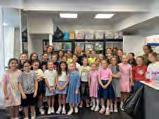
A dedication for the Family Room in Manchester was held to honour the legacy made by Judy Kelner z’l to Chai. Daughter Rachel Mesrie hosted a tea for friends and family and said, 'We all so enjoyed seeing the fantastic facilities and understanding more about Chai. It has given our family so much comfort to know that my parents have left a legacy to such a wonderful charity.'
If there’s one thing guaranteed to gather support, it’s a communal challah bake. Chai client Yvonne Minsk was the bakerin-charge at Bury Shul in Manchester and the event was organised to wish a speedy ‘refuah’ to her husband, Martin. £2,200 was raised, along with many loaves.

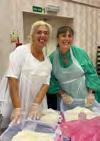
Everyone who takes on a challenge to raise money for Chai digs deep into their resources, in recognition of the demands clients endure when faced with a cancer diagnosis. This year saw incredible feats over mountains, in water, on horseback and two wheels. We applaud and thank you all

James Laikin completed the 130-mile Sea to Sea Cycle Ride over four demanding, soaking days. ‘It took determination and perseverance,’ said James, who raised £614 for Chai and the Mark Evison Foundation.
Ivan Gluckman cycled to every London football league club in memory of his father Stephen and raised £2,785. He said,

‘Both my parents died from cancer and it felt appropriate to support this fabulous charity.'
Michael Firestone’s 600km Israel: North to South Cycle, was cancelled last October but supporters still donated £513.
Simon Ardeman completed the National Three Peaks Challenge, through the Simon Cooper Foundation. Scaling Ben Nevis in Scotland (1,345m), Scafell Pike in England (978m) and Snowdon in Wales (1,085m) all inside 24 hours, Simon's stats were 23 miles walked, 3,408 metres ascended, 462 miles driven, 6,135 calories burned, a finishing time of 21 hours 57 minutes – and just over £1,000 raised. ‘The night hike and torrential rain were gruelling,’ he said. Simon's stepfather-in-law passed away in 2020 from bowel cancer. ‘Chai supported the whole family and we are eternally grateful.’
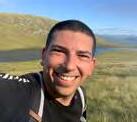
More than 90 Birmingham University students competed in the Selly Oak Women's Football Tournament which, confusingly, was made up of 15 mixed six-a-side teams. Eventual winners were team Real Madreidal with Daniel Mellor and Neriah Strauss named players of the day. JLE sponsored the delicious barbecue that followed and the event raised £550 for Chai. ‘Chai was chosen in memory of my grandma Elaine Lampert,’ said Jessica Kosky. ‘She lost her battle to cancer in 2022 but the services provided by Chai were nothing short of brilliant, offering her incredible comfort and support.’
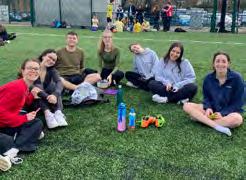
Emma Weintroub marked her ‘cancerversary’ by giving back to Chai, which has supported her since her breast cancer diagnosis. ‘I couldn't live so positively without my sisters, my children and Chai,’ she says. She raised £1,118.


Martin Kaye sadly lost his wife Michele last year. Chai supported Michele and continues to help the family. Martin's hair had been growing since lockdown so there was ample to make into a wig for someone going through hair loss associated with chemotherapy. Kink Salon in Mill Hill, where Michele used to go, did the honours and Chai and Bowel Cancer UK each received £7,659.75
Northwood United Synagogue hosted the perfect Rosh Hashanah event with local apiarist David Roth who spoke about his beekeeping adventures. ‘It’s where humanity and nature combine,’ says Roth who makes honey as well as Havdalah candles. A honey cake tasting followed, donated by local deli, Noshers and the KLBD donated mini honey pots for guests to take home. The event, which raised £195, was in memory of Sharon Feldman-Vazan who was supported by Chai.
We are so sincerely thankful to the many supporters who choose to celebrate their special simchas by asking friends to donate to Chai. To set up a celebration page, please call Jacki Stanton on 020 8457 3231
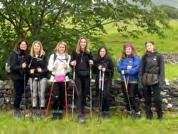

Jo Rose, Vanessa Krell, Stacey Elvey, Kim Milich, Sophie Weingarten, Marcelle and Georgia Rose took on the Yorkshire Three Peaks challenge in torrential rain (a theme this year!) for Chai. It was to honour close friend Jess Dvir z'l who passed away in January. Jess had said, 'Chai is a shining light to so many families.' Jess' husband Josh did the Maccabi Fun Run and all together they raised more than £43,000. In addition, Sophie raised an additional £2,991 in memory of Shalom (Illan) Cohen and Moira Posener
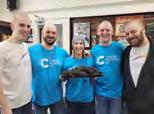
When Emma Cohen was diagnosed with breast cancer, her sons were determined to show their appreciation for Chai’s support. Acknowledging the impact of chemotherapy, Daniel, 27, Harry, 25, James, 22 and Joshua, 18 had a collective head shave. ‘We want to support others going through chemo.’ Mario at Goaties Barber Shop gave the brothers fun cuts before it all came off. Emma said afterwards, ‘I’m so grateful to my boys, all my friends and family and of course everyone's donations.’ The boys raised £6,146
Alongside Josh, more than 70 runners participated in the annual Maccabi Community Fun Run, convening at the StoneX stadium in London’s Mill Hill. It's an annual opportunity to bring all ages together to raise money for charity, draw strength from the sense of togetherness, and to exercise. In all, more than £7,000 was raised for Chai.
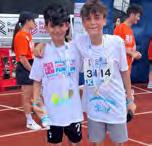
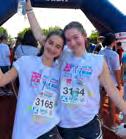
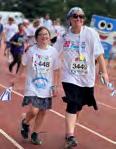
Five dedicated runners made up Team Chai this year:
Zak Fraser completed his run in 4 hours 48 minutes, raising £10,566. He said, ‘Dad passed away from cancer in 2018. Through diagnosis and treatment, Chai was an amazing source of support. Mum, whom we lost suddenly in 2022, also benefitted from Chai during these difficult years.'
Emma Levy and husband, Jonny, ran for Chai and Future Dreams. See more of her story, opposite.



Ric Feingold finished in a time of 4 hours 17 minutes and raised £2,812. ‘Chai gave Mum so much support when she was diagnosed and has been there for me since,’ said Ric.
Daniel Sunshine headed over the finish line in 5 hours 14 minutes. Daniel, who raised £3,858, said: 'Running for Chai is a big honour. They have helped so many people I know.'

Nathaniel Davidson raised £3,480. 'The last few years in my family have been upsetting with overlapping cancer diagnoses, including the loss of my father to stomach cancer,' he says. 'Chai has been a lifeline for my family.'
Acknowledging the commitment marathon training (let alone running) takes, Louise Hager said: 'We are in awe and salute all our runners for their dedication and commitment. Through all their efforts, Chai can continue to be there for all those who turn to us.'
Dave and Sharon Schindler ran their first Comrades Marathon, The Ultimate Human Race 14 years ago. They gave it another whirl this year, running in memory of Dave’s lifelong friend, Mike Solomon, who was supported by Chai for three years. The race begins in Durban and ends 54 miles later in Pietermaritzburg. ‘Chai did everything they could to support Mike and his family and we feel privileged to have completed the challenge for him.’ Dave crossed the line in 11 hours 18 minutes, Sharon in 12 hours 20 minutes, having raised £1,089.

Ari’s Army, made up of Eliana, Jesse, Lyla, Emmy, Seth, Levi and Izac organised a Kids' Tennis event to raise money for Chai, Camp Simcha, and Spread a Smile to thank the charities supporting the Anstey family through 13-year-old Ari’s treatment for high risk neuroblastoma. It was a ‘wonderful uplifting atmosphere,’ said one of the 30 participants who helped raise a phenomenal £5,847 for each charity!

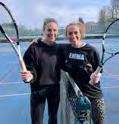

Facing breast cancer a few years ago, Emma Levy says the experience, ‘100% changed my mindset about life.’ She is celebrating her 40th birthday with a year of sporting challenges, which have so far included a 24-hour tennis challenge, the TCS London marathon, a family Park Run and swimming the Serpentine. To date, Emma has raised £65,000 for Chai and Future Dreams. ‘Completing Ride London a month after the Marathon was tough but doing it with my brother, cousin and friends made it more than worth it,’ said Emma.

Susannah Baron underestimated the impact of trekking the 800km Camino de Santiago barely six months after surgery and chemotherapy for breast cancer. ‘I decided to fundraise for Chai and the Royal Marsden during chemotherapy,’ she said. ‘I couldn't move after day one in the saddle for nine hours!' Laughter and friendship eased the soreness as she rode through medieval Spanish villages and dramatic landscapes. ‘It was a hugely healing experience,’ Susannah said. After weeks of sunshine, the final 110km walk was a rain-drenched affair, softened by Susannah’s son Josh joining her. ‘Reaching the finish line in Fisterra, I jumped in the sea to mark the end of my journey.’ Susannah raised £1,029.53
Marcus Ardeman has been walking to raise money for charity since 2016. Marcus’ mother passed away in 2023 and to recognise all the support she, family and friends received from Chai, Marcus completed a month-long 100 Mile Madness walking challenge. ‘The first route was the most emotional, between my late parents' flat and where mum was treated at Mount Vernon,’ said Marcus who raised in total £4,745 for Chai, the Shine for Shani Charitable Trust Foundation, Cancer Research UK and Macmillan Cancer Support.

Hannah Frankel and Simone Lubin, who together run Deli to the Door, made a highaltitude detour recently, jumping out of a plane at 12,000 feet. ‘To say we were nervous is an understatement,’ says Hannah. ‘Simone panics standing on a footstool!’ Attached to their jumping partners, the pair were in freefall at 120 mph for 40 seconds before their parachutes opened. ‘Then we glided down to earth taking in the amazing scenery below!’ It was their 'thank you' to Chai for all the support Hannah's father Harvey has received while going through chemotherapy for cancer. ‘With the support of the Chigwell community, Chai, family and friends, a little bit of chemo, and a positive attitude, Dad continues doing the things he loves. Chai is with us all the way, unconditionally,' she says. The pair raised £6,933



Amy Jacobs along with Adam Phillips, Natasha Fletcher and Sophie Nejad ran the Hackney Half Marathon in May to honour the resilience, strength and determination of Amy’s mother since her cancer diagnosis in August 2023. ‘Even though Mum has finished treatment, Chai continues to provide fantastic support. Mum talks about how Chai is a safe space for her. We are honoured to be running for a charity that has provided such care and support to my family and to so many others.' By the time all four crossed the finish line, they’d raised £10,362.75
Visit chaicancercare.org and follow our quick links to make donating easy
MARK A SPECIAL OCCASION
Nominate Chai to receive a donation in lieu of gifts.
Contact Jacki Stanton: jackistanton@chaicancercare.org or call on 020 8457 3231
FUNDRAISE FOR US
We can support and advise you on how to make an event or challenge a roaring success.
Contact Caroline Tunkel at carolinetunkel@chaicancercare.org or call 020 8457 3233.
Eleven intrepid explorers with Chai on their minds stayed the course to complete the Scottish Chailands Triple Challenge, the sixth bespoke ‘Chai Challenges You’ adventure. Over two days the team summited the UK’s highest mountain, Ben Nevis, hiking over all terrains. They cycled 48km and kayaked 13km along the beautiful River Lochy. Their incredible efforts raised £62,000 to support Chai’s BRCA-related services. Following the challenge, Chai Ambassador and Trustee Alexandra Maurice, said: ‘This was an incredibly gruelling challenge but nothing in comparison to what Chai clients experience. Many in the group have seen firsthand the amazing support Chai provides.’ Chai fives to participants Alex and Pearl Maurice, Melissa Swerling, Kenneth Ornstein, Sian Levy, Dalia and Lara Kay, Eliana Blankstone, Alexis Colman, Samantha Manning and Carolyn Webber. Louise Hager said of the group’s accomplishments: ‘They are truly remarkable! We salute Alexandra for her extraordinary dedication to Chai.’

DONATE ONLINE
Swift, and secure, scan this QR code or click on the Make a Donation tab on our website and follow the instructions. chaicancercare.org/donate
BY PHONE
Call Jacki Stanton on 020 8457 3231 or Dana Levene on 020 8457 3232
BY POST
Send cheques or charity vouchers to: Chai Cancer Care
142 – 146 Great North Way London NW4 1EH
LEAVE A LEGACY
Visit Jewish Legacy Giving (jewishlegacy.org.uk) to find out more. We would also be honoured to recognise your generosity during your lifetime.
Contact Louise Harger: louise.hager@chaicancercare.org or call 020 8202 2211
GIFT AID YOUR DONATION
If you are a UK taxpayer, Gift Aid increases your donations by 25%.
Download a Gift Aid Declaration form from our website.
FUNDRAISE FOR FREE
Our new Charity Extra fundraising platform lets you raise money with no commission charges. It's so easy to set up your fundraising page, upload photos, see your donations, and update your supporters with news. See charityextra.com/cause/ chai or scan the QR code
GIFT ONLINE
Hosting a Shabbat dinner, lunch or party? Invite guests to skip the gift… and donate direct to Chai.
Visit giveitapp.org
Thanks to the generosity of the community, Chai Cancer Care provides specialised support to thousands of people across the UK who have been affected by a cancer diagnosis.
To find out more please call our Freephone Helpline on 0808 808 4567 or visit www.chaicancercare.org
Services are available at:
North West London
South London | Essex
Hackney | Southend
Birmingham | Leeds
Liverpool | South Manchester
North Manchester
Glasgow | Clients’ Homes
Advisory Services
Advocacy & Information
Advice Bureau
Financial & Legal Guidance
Jewish Perspectives on Cancer
Medical Connections
Nutritional & Dietary Advice
Resources & Information
Counselling
Counselling for Individuals, Couples & Families
Counselling for Genetic Issues
Music Therapy
Relationship Counselling
Telephone, Skype & Zoom Counselling
Children, Teenage and Family Service
Art Therapy
Childrens Activity Workshop
Music Therapy
Play Therapy
Chai in Schools
Therapies
Manual Lymphatic Drainage
Pelvic Health Physiotherapy
Physiotherapy
Post-Prostate Surgery Advice
Scar Tissue Massage
Chai Medical Clinic
Complementary Therapies
Acupuncture
Aromatherapy
Craniosacral Therapy
Foot Care Service
Healing
Hot Stones
Hypnotherapy
Indian Head Massage
Reflexology
Reiki Shiatsu
Therapeutic Massage
Home Support Service
Image Resource Services
Hair, Skin & Nails Advice and Care
Manicures
Semi-Permanent Makeup
Styling Workshop
Group Activities
Art Workshop Bridge
Computer Lessons
Creative Writing
Israeli Dancing Jewellery Workshop
Knitting
Laughter Therapy
Lymphoedema Exercise
Meditation
Mindfulness
Music Workshop
Open/Supervised Gym Sessions
Pet Therapy Pilates
Table Tennis
Walking Group
Wednesday Afternoon
Social Yoga
Support Groups
BRCA Groups
Bereavement Groups
Breast Buddies
Groups for Cancer Patients/ Carers
Lifestyle Group

Men’s Group
Parenting Support Group
Women’s Group
Young Adults’ Group
By Your Side Volunteer Service